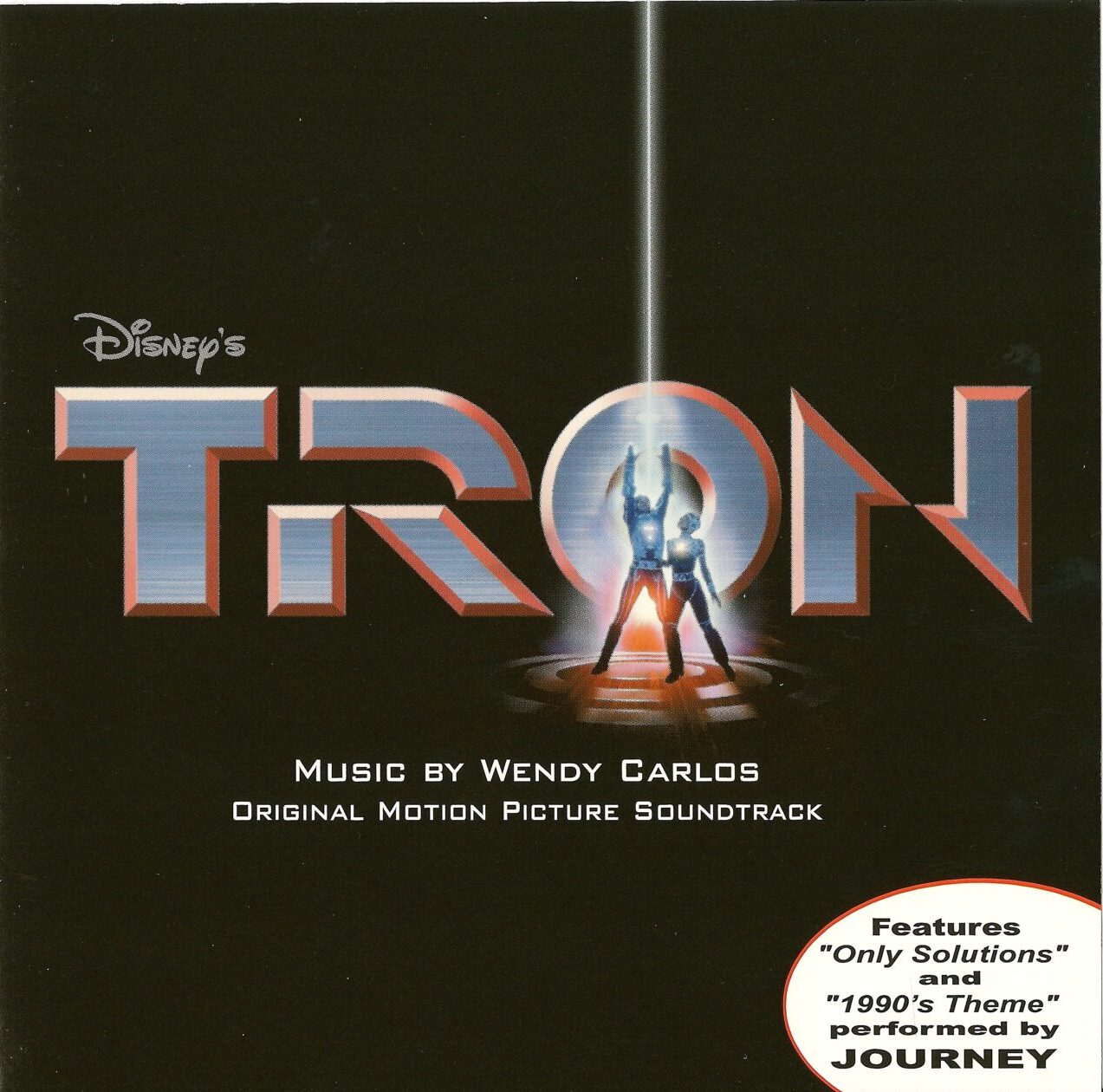
Tron (2002 remaster) – music by Wendy Carlos
I’ve waxed rhapsodic about this outstanding, pioneering score which combines synthesizers, orchestra and chorus; long a favorite, Wendy Carlos’ soundtrack from Tron has never been officially available on CD. Bootlegs have been circulating for years, as have MP3s, both of them usually sourced from the vinyl LP. In the intervening years, Carlos restored and remastered the original tapes on her own time, patiently waiting to release it on her own label, or perhaps on Disney’s label. Fans eagerly awaited a release date for years, but considering that Tron, like The Black Hole, seemed to be a film that Disney was all but ashamed of, it didn’t seem like a good idea to hold one’s breath.
Fast forward with us now to late 2001. Disney has an eagerly awaited new collector’s edition 2-DVD set of Tron on store shelves, featuring some new material but also a lot of repurposed material from the highly sought-after laserdisc version. Even the toys have been re-released, and most improbable of all, director Steven Lisberger has been approached to write and perhaps direct a sequel to the original Tron. In short Tron is suddenly a hot property once again to Disney, which is looking to exploit that property in any way possible.
Someone at Disney must’ve asked, “What about the soundtrack?” And, as with the DVD extras, the studio was keen on taking the fastest and cheapest way out of that question – they called composer Wendy Carlos and asked if she just happened to have CD-ready masters of the music on hand that could be used to press a re-release.
As it just so happens, Carlos spent the late 1990s restoring the original analog tapes of the scoring sessions for Tron, and it was no easy task. As has been chronicled on her website, Carlos found that much of her late ’70s/early ’80s work was all but lost due to a serious quality problem with her chosen brand of reel-to-reel audiotape. The tape had all but melted, and had to be “baked” in carefully controlled conditions for there to be any chance of retrieving the material ever again. In the case of Tron, it worked, and as early as 1999 Carlos had a shiny new digital master of the tape ready to go – but Disney had a stranglehold on the rights, preventing her from rereleasing it on her own label. In other words, Disney’s last minute marketing decision finally brought Tron‘s soundtrack to CD.
And I, for one, thank them. This new CD is everything the fans had hoped – and there are even previously unreleased tracks, such as the wonderful “The Break-In” (for strings, cello and celeste), which added so much of the playful-cum-menacing atmosphere to the scenes where Flynn, Alan and Lora break into the ENCOM labs. Also included is an early version of “TronAction”, loaded with enough wild dissonance to scare off some listeners (this version was also used in some pre-release showreels sent to theater owners and distributors), and a harpsichord sketch of the movie’s main theme, played with “no gimmicks and no overdubs” by Carlos herself.
Surprisingly absent from the disc is the unused music from the light cycle chase; the music can be heard as an alternate scene on the DVD, but isn’t included here. It would’ve been nice to add that to the package as well.
 Even the two Journey songs – “Only Solutions” and the instrumental “1990s Theme” (ha!) – are intact, and the original LP tracks are featured in the original running order.
Even the two Journey songs – “Only Solutions” and the instrumental “1990s Theme” (ha!) – are intact, and the original LP tracks are featured in the original running order.
It’s so nice to finally have a Tron soundtrack CD that didn’t come out of someone’s CD burner. The music has more than earned a real release, and now – at last – it’s got one.
- Creation Of Tron (0:49)
- Only Solutions performed by Journey (3:42)
- We’ve Got Company (2:19)
- Wormhole (2:30)
- Ring Game And Escape (2:57)
- Water Music and TronAction (2:25)
- Tron Scherzo (1:47)
- Miracle And Magician (2:41)
- Magic Landings (3:44)
- Theme From Tron (1:37)
- 1980’s Theme performed by Journey (2:08)
- Love Theme (2:08)
- Tower Music – Let Us Pray (3:48)
- The Light Sailer (2:37)
- Sea Of Simulation (3:24)
- A New Tron And The MCP (5:11)
- Anthem (1:40)
- Ending Titles (5:17)
- TronAction (Original Version) (1:29)
- Break In (for Strings, Flutes and Celesta) (5:35)
- Anthem For Keyboard Solo (1:09)
Released by: Disney
Release date: 2002
Total running time: 58:59
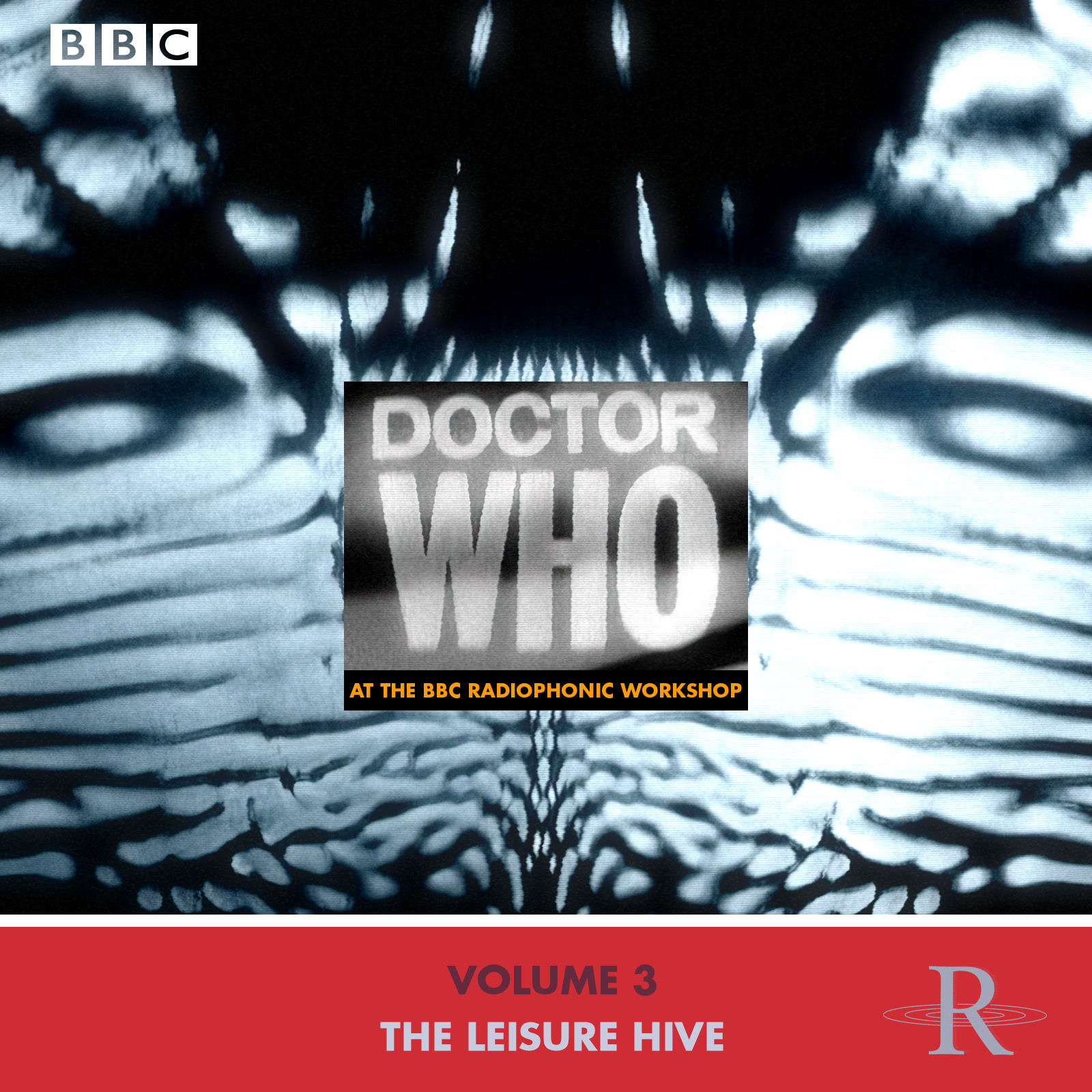
Doctor Who, Volume 3: The Leisure Hive
 In 1979, John Nathan-Turner took over the producer’s seat of Doctor Who and set about making sweeping changes to the show’s visual look, storytelling style, and even the signature sound effects and music. Dudley Simpson had been composing almost all of the music for every episode since 1970, but Nathan-Turner was concerned that, as Simpson was also doing the music for the BBC’s other SF series, Blake’s 7, the two shows now sounded too similar. The producer approached the BBC’s own Radiophonic Workshop, which had provided the series’ sound effects and main theme since 1963, to provided incidental music as well – and the change in sound was drastic. Dudley Simpson’s simple but elegant acoustic ensemble gave way to the Radiophonic Workshop’s expansive, all-electronic synth-orchestra, and nowhere was this contrast as evident as with the first story of Nathan-Turner’s reign, The Leisure Hive. Peter Howell, who also arranged the new version of the show’s famous theme music, let loose with a barrage of music that fits the definition of a “wall of sound,” with thick, Vangelis-style texture drenching much of the action. In his small portion of the liner notes, Howell confesses that The Leisure Hive’s music was, perhaps, “too omnipresent” – and he does have a point, as Leisure Hive may have been the most music-heavy Doctor Who until The Curse Of Fenric or, perhaps, The Five Doctors. But it’s a ton of good, solid analog-synth fun, and in the context of what had come before it was certainly a great shock.
In 1979, John Nathan-Turner took over the producer’s seat of Doctor Who and set about making sweeping changes to the show’s visual look, storytelling style, and even the signature sound effects and music. Dudley Simpson had been composing almost all of the music for every episode since 1970, but Nathan-Turner was concerned that, as Simpson was also doing the music for the BBC’s other SF series, Blake’s 7, the two shows now sounded too similar. The producer approached the BBC’s own Radiophonic Workshop, which had provided the series’ sound effects and main theme since 1963, to provided incidental music as well – and the change in sound was drastic. Dudley Simpson’s simple but elegant acoustic ensemble gave way to the Radiophonic Workshop’s expansive, all-electronic synth-orchestra, and nowhere was this contrast as evident as with the first story of Nathan-Turner’s reign, The Leisure Hive. Peter Howell, who also arranged the new version of the show’s famous theme music, let loose with a barrage of music that fits the definition of a “wall of sound,” with thick, Vangelis-style texture drenching much of the action. In his small portion of the liner notes, Howell confesses that The Leisure Hive’s music was, perhaps, “too omnipresent” – and he does have a point, as Leisure Hive may have been the most music-heavy Doctor Who until The Curse Of Fenric or, perhaps, The Five Doctors. But it’s a ton of good, solid analog-synth fun, and in the context of what had come before it was certainly a great shock.
Also included, with a dedication to the late Delia Derbyshire, is a newly-reconstructed stereo mix of the original theme music assembled by Mark Ayres from tapes of the original elements Derbyshire used to build  the theme in 1963. Maybe I was expecting a little more wild, surround-sound-style stereo separation of those elements, but most of the stereo enhancement seems to be focused on the persistent “whooshing” sounds and not the music itself. There’s also a selection of sound effects from Leisure Hive, Meglos and Full Circle; music from the latter two stories is presented on Volume 4 of the Radiophonic Workshop collection.
the theme in 1963. Maybe I was expecting a little more wild, surround-sound-style stereo separation of those elements, but most of the stereo enhancement seems to be focused on the persistent “whooshing” sounds and not the music itself. There’s also a selection of sound effects from Leisure Hive, Meglos and Full Circle; music from the latter two stories is presented on Volume 4 of the Radiophonic Workshop collection.
- Doctor Who: Opening Theme (0:38)
- Brighton Beach / K9 Kaput (2:54)
- Into Argolis (2:36)
- The Generator / Intruders (3:20)
- “His Time Has Come” / Earth Shuttle Arrives (1:55)
- Tachyon Terror (0:56)
- Into The Generator (4:16)
- The Hive / Mena Fades (3:04)
- Looking For Mr. Brock (3:57)
- Testing Time (5:09)
- The Limitation Program (1:56)
- The West Lodge (2:03)
- The Child Of The Generator (1:39)
- The Foamasi (4:59)
- The Argolin Dawn (3:05)
- “We, Pangol” (3:55)
- Re-Creation (4:11)
- Rebirth (3:19)
- Back To Work (0:46)
- FX: Argolis Exterior Planet Atmosphere (2:05)
- FX: Earth Shuttle Arriving (1:04)
- FX: Generator Hall (1:30)
- FX: Boardroom (1:38)
- FX: Hologram (0:32)
- FX: Corridor Background (0:57)
- FX: Generator And Screen (0:31)
- FX: Tachyon Drive Engaged (0:30)
- FX: The Screens Of Zolpha-Thura (1:01)
- FX: Laboratory Ascends (1:11)
- FX: Dodecahedron Energy Beams (0:31)
- FX: Mistfall Mist (0:51)
- FX: Operating Room (1:02)
- FX: Starliner Instrument Panel (1:02)
- Doctor Who Theme: Original Version, 2002 Stereo Remix (2:21)
Released by: BBC Music
Release date: 2002
Total running time: 73:11
Animaniacs Variety Pack – music by Richard Stone
 One of my few good memories about programming during the time I worked at a Fox affiliate in the early 1990s is Animaniacs, a Warner Bros.-produced cartoon with plenty of jokes that would fly in under the kids’ radar and give a big belly laugh (or maybe just a knowing smirk) to any adults who happened to be watching with their kids.
One of my few good memories about programming during the time I worked at a Fox affiliate in the early 1990s is Animaniacs, a Warner Bros.-produced cartoon with plenty of jokes that would fly in under the kids’ radar and give a big belly laugh (or maybe just a knowing smirk) to any adults who happened to be watching with their kids.
God, but I miss that show. With almost as many pop culture references as Mystery Science Theater 3000, and rollicking good fun to boot, Animaniacs is still probably underrated today.
It’s easy to dismiss cartoon music these days as being nothing but an ongoing pastiche of the works of Golden Age toon tunemeister Carl Stalling, but every once in a great while the right show is paired with the right composer, and you get magic. Richard Stone’s work on Animaniacs is an excellent example of this.
Animaniacs Variety Pack is the second Animaniacs album to come down the pike, and it’s also the better of the two, with more of the songs that fans both young and old probably wanted from the first one: the theme songs from Pinky & The Brain and Slappy Squirrel stand out foremost in my mind there. A personal favorite of mine is “Variety Speak”, an affectionately goofy homage to the kind of entertainment-industry lingo which brought us such headlines as the infamous “Hix Nix Stix Pix.” The constant recurrance of “All The Words In The English Language” can be a bit annoying if you’re not in the right frame of mind…but then again, if you  weren’t in that frame of mind, I doubt you’d be listening to Animaniacs Variety Pack, now would you?
weren’t in that frame of mind, I doubt you’d be listening to Animaniacs Variety Pack, now would you?
My one complaint: like the earlier Animaniacs song CD, Variety Pack weighs in at a little under a paltry half-hour. Even with a grand total of barely an hour of music from the series available, I know that more good tunes came out of this show than that.
- Variety Speak (1:57)
- The Monkey Song (2:52)
- All The Words In The English Language, Part 1 (1:01)
- Pinky And The Brain (1:30)
- Cheese Roll Call (2:32)
- Multiplication (1:29)
- Dot’s Song (0:44)
- Dot’s Quiet Time (1:39)
- All The Words In The English Language, Part 2 (1:13)
- Slappy Squirrel Theme (0:33)
- Wakkos’s Two-Note Song (2:05)
- The Presidents (3:20)
- The Anvil Song (0:50)
- At The Big Wrap Party Tonight (2:57)
- All The Words In The English Language, Part 3 (1:00)
- The Goodbye Song (0:32)
Released by: Kid Rhino
Release date: 1995
Total running time: 26:14
Star Wars Episode II: Attack Of The Clones
 This may be the daftest review ever to appear in the many pages of theLogBook.com’s music review section, but here goes. I’ve been carefully avoiding any story spoilers for Star Wars Episode II: Attack Of The Clones for something like three years now. I will check out Lucasfilm’s official web site for the movie, but I haven’t been looking for story summaries, spoilers, scripts, or any of that. I was actually honked off at the fairly major spoilers included on the action figure packaging for the new movie. And I debated whether or not to get the soundtrack in advance of the movie.
This may be the daftest review ever to appear in the many pages of theLogBook.com’s music review section, but here goes. I’ve been carefully avoiding any story spoilers for Star Wars Episode II: Attack Of The Clones for something like three years now. I will check out Lucasfilm’s official web site for the movie, but I haven’t been looking for story summaries, spoilers, scripts, or any of that. I was actually honked off at the fairly major spoilers included on the action figure packaging for the new movie. And I debated whether or not to get the soundtrack in advance of the movie.
But if I hadn’t done that, we would’ve missed out on the chance to have this extremely strange chat.
The first track, opening with the traditional Star Wars theme, descends into a repetitive musical motif that spirals downward and then begins again. Remember, I have no idea what’s happening in this scene, so I have no idea how appropriate it is. Nice music, though.
“Love Theme From Attack Of The Clones” is the film’s big romantic statement, and judging by the rest of the disc, seems to serve not only as a theme for the burgeoning relationship between Anakin and Padmè that has been hinted at in the theatrical trailers, but also as a theme for Anakin himself.
“Zam The Assassin and The Chase Through Coruscant” is a lengthy track – over ten minutes’ worth – loaded with action and suspense music. Perhaps the biggest surprise here is the inclusion of wild distorted electric guitar riffs in a few places, which may have some fans up in arms, but not me. It actually sounds kinda cool – it’s not exactly a Force Commander-style remix or anything, but just another voice in the orchestra, and it integrates well. Again, no idea what’s going on in this scene, but a lot of the rumbling action cues remind me a great deal of Williams’ score from Nixon, and that’s not a bad thing. (It’s not as if he’s pulling a James Horner cut-and-paste scoring job on us, either. It’s very different music with a similar stacatto rhythm to it.) Maybe they’re chasing Zam through Coruscant. Guess I’ll find out soon enough, eh?
Other tracks of note include “The Tusken Camp and Homestead”, a track which surprised the heck out of me by jumping full-blast into “Duel Of The Fates” from the soundtrack of Star Wars Episode I: The Phantom Menace. This is a rare case where I’m pretty sure I do have a good guess as to what happens in this scene, and why that particular motif comes up. And I’m not telling.
“Love Pledge and The Arena” includes some references to such Star Wars chestnuts as the Force theme and something presaging the AT-AT music from The Empire Strikes Back, but the biggest surprise in both this track and “Confrontation With Count Dooku and Finale” is the bold statement of “The Imperial March (Darth Vader’s Theme)”. I have absolutely no idea what’s happening here, and the fact that this particular theme appears in this movie makes me wonder just what is happening, and whether or not it would’ve been more appropriate to hold it until Episode III. But I can’t really say until I see the movie.
Overall, I’ve enjoyed the Episode II soundtrack as a listening experience alone. Some fans have railed against such things as the electric guitar and the seeming lack of strong thematic material in what’s on this album, but it’s important to remember that this is just the suite album, and a two-disc Ultimate Edition with the complete score is probably about 6-8 months away, as was the case with the Episode I Ultimate Edition set. Don’t fret over the guitars, either. Did you freak out when Williams used sax and steel drums in the original Star Wars? Of course not – not only did we have no precedent for Star Wars music then, but it was novel and appropriate and wouldn’t have been the same without it. And maybe that’s the case here too. On the virtue of the music alone, I like it.
 You may think it’s a waste of your time to read an almost-spoiler-free music review of the soundtrack from someone without a clue as to its context in the film, but we’ll give the complete score release a more thorough review with that in mind when it hits the shelves. And I wanted to experiment with reviewing the music with no preconceived notions of whether or not it fits the scene – reviewing the music purely as a listening experience. And for the record, it’s a good experience.
You may think it’s a waste of your time to read an almost-spoiler-free music review of the soundtrack from someone without a clue as to its context in the film, but we’ll give the complete score release a more thorough review with that in mind when it hits the shelves. And I wanted to experiment with reviewing the music with no preconceived notions of whether or not it fits the scene – reviewing the music purely as a listening experience. And for the record, it’s a good experience.
- Star Wars Main Title and Ambush On Coruscant (3:46)
- Love Theme From Attack Of The Clones (5:33)
- Zam The Assassin and The Chase Through Coruscant (11:07)
- Yoda and The Younglings (3:55)
- Departing Coruscant (1:44)
- Anakin And Padmè (3:56)
- Jango’s Escape (3:48)
- The Meadow Picnic (4:14)
- Bounty Hunter’s Pursuit (3:23)
- Return To Tatooine (6:56)
- The Tusken Camp and Homestead (5:54)
- Love Pledge and The Arena (8:29)
- Confrontation With Count Dooku and Finale (10:46)
Released by: Sony Classical
Release date: 2002
Total running time: 73:31
dada
 This album – the band’s fourth and probably last – features just about everything that’s good about dada. The energy and harmonies most prominently featured on Puzzle are back, and so are the catchy melodies, this time with a little bit more electric guitar and production complexity. “Where You’re Going” uses echoing guitar as an anchor in the background, while the percussion, bass and more guitar drive the song. “The Ballad of Earl Grey and Chamomile” features more great guitar work and is a close second as my favorite song on the album. It’s yet another look back at happier times, which might become a clichè if dada didn’t do it so damned well. The background vocals on the chorus do a tremendous job of making you feel the excitement of those better days. “Information Undertow” has some of dada’s most inventive lyrics, and they only seem more apropos four years later, although my appreciation of lines like “I’m everywhere I want to be, nowhere especially” may say more than I want to about my own online habits. Goodbye is
This album – the band’s fourth and probably last – features just about everything that’s good about dada. The energy and harmonies most prominently featured on Puzzle are back, and so are the catchy melodies, this time with a little bit more electric guitar and production complexity. “Where You’re Going” uses echoing guitar as an anchor in the background, while the percussion, bass and more guitar drive the song. “The Ballad of Earl Grey and Chamomile” features more great guitar work and is a close second as my favorite song on the album. It’s yet another look back at happier times, which might become a clichè if dada didn’t do it so damned well. The background vocals on the chorus do a tremendous job of making you feel the excitement of those better days. “Information Undertow” has some of dada’s most inventive lyrics, and they only seem more apropos four years later, although my appreciation of lines like “I’m everywhere I want to be, nowhere especially” may say more than I want to about my own online habits. Goodbye is  a beautiful ballad about the end of a relationship. “Beautiful Turnback Time Machine” is a cool track about what we’d do if we could do it all over again. “This Thing Together”, a song whose optimism may or may not be tempered by the “You know I’ll miss you when you’re gone” chorus, is carried by the vocals but has a great rhythm to it.
a beautiful ballad about the end of a relationship. “Beautiful Turnback Time Machine” is a cool track about what we’d do if we could do it all over again. “This Thing Together”, a song whose optimism may or may not be tempered by the “You know I’ll miss you when you’re gone” chorus, is carried by the vocals but has a great rhythm to it.
- Information Undertow (3:33)
- Playboy in Outerspace (4:53)
- Where You’re Going (3:39)
- California Gold (5:30)
- Thins Thing Together (3:48)
- Sweet Dark Angel (4:10)
- Goodbye (3:55)
- Beautiful Turnback Time Machine (4:21)
- Baby Really Loves Me (4:13)
- Spinning My Wheels (4:45)
- Outside (3:08)
- The Ballad of Earl Grey and Chamomile (3:46)
- Agent’s Got No Secret (4:22)
Released by: MCA
Release date: 1998
Total running time: 54:11
dada – Puzzle
 To the extent that dada has any hits, this is where you’ll find them. The sometimes-cynical sense of humor of “Dizz Knee Land”, with its once-again-pertinent line “I just flipped off President George / I’m going to Dizz Knee Land!”, permeates a few of the other tracks, like “Here Today, Gone Tomorrow” and “Posters”. But there is also a solid emotional core to the songwriting. “Timothy” is the story of a boy whose life is so depressing he resorts to fantasy; the accompanying strings might come off as overbearing if they weren’t so well balanced by the understated bass, acoustic guitar and vocals, all of which build in intensity throughout the song. “Surround” is one of the most beautiful songs I have ever heard. At its core, it’s just percussion work and acoustic guitar playing a melody that’s simple yet elevating (with similar lyrics), but it layers other instruments in so well that the resulting harmonies intensify the feeling. Dim captures the sense of desperation of a person who looks back on his life at the end of a
To the extent that dada has any hits, this is where you’ll find them. The sometimes-cynical sense of humor of “Dizz Knee Land”, with its once-again-pertinent line “I just flipped off President George / I’m going to Dizz Knee Land!”, permeates a few of the other tracks, like “Here Today, Gone Tomorrow” and “Posters”. But there is also a solid emotional core to the songwriting. “Timothy” is the story of a boy whose life is so depressing he resorts to fantasy; the accompanying strings might come off as overbearing if they weren’t so well balanced by the understated bass, acoustic guitar and vocals, all of which build in intensity throughout the song. “Surround” is one of the most beautiful songs I have ever heard. At its core, it’s just percussion work and acoustic guitar playing a melody that’s simple yet elevating (with similar lyrics), but it layers other instruments in so well that the resulting harmonies intensify the feeling. Dim captures the sense of desperation of a person who looks back on his life at the end of a  relationship and isn’t sure how he got where he is; as he asks, “Can’t this car go any faster / ’cause I can still see where I am,” the drums and electric guitar drive the song forward. I don’t have a DNP list like Earl’s, but if I did, it would be right up there. Suffice to say it’s one of my favorites.
relationship and isn’t sure how he got where he is; as he asks, “Can’t this car go any faster / ’cause I can still see where I am,” the drums and electric guitar drive the song forward. I don’t have a DNP list like Earl’s, but if I did, it would be right up there. Suffice to say it’s one of my favorites.
- Dorina (6:06)
- Mary Sunshine Rain (4:39)
- Dog (4:13)
- Dizz Knee Land (4:06)
- Surround (3:38)
- Here Today, Gone Tomorrow (4:42)
- Posters (4:05)
- Timothy (4:00)
- Dim (4:21)
- Who You Are (3:25)
- Puzzle (6:20)
- Moon (5:18)
Released by: I.R.S.
Release date: 1992
Total running time: 54:58
Neil Finn – various singles
 These two highly enjoyable singles give Neil Finn some common ground with Tori Amos. Both of them have released non-album B-sides that are, in some cases, better than material that actually made it onto their albums. On the first Australian CD single, supporting the single “Sinner” (still possibly my favorite song on Neil’s debut solo album), there’s also the album cut “Astro” and two wonderful, gorgeous ballads, “808 Song” (co-written with Try Whistling This collaborator and Midnight Oil alumnus Jim Moginie) and “Identical Twin”, both of which more than deserved slots on the album. To give one example, I would rather have heard “808 Song” and “Identical Twin” on the album than the exceedingly long and slow final track, “Addicted”. To fill out the “She Will Have Her Way” single (also an Aussie import), there are two bouncy, somewhat more upbeat songs – “Tokyo” and “She Comes Scattered” – and an incredible live version of “Sinner” recorded in Studio B at Abbey Road. “Tokyo” is a somewhat silly song, while “She Comes Scattered”, with its heavy helping of fuzz bass, reminds me a lot of “Kiss The Road Of Rarotonga” on the Finn Brothers album.
These two highly enjoyable singles give Neil Finn some common ground with Tori Amos. Both of them have released non-album B-sides that are, in some cases, better than material that actually made it onto their albums. On the first Australian CD single, supporting the single “Sinner” (still possibly my favorite song on Neil’s debut solo album), there’s also the album cut “Astro” and two wonderful, gorgeous ballads, “808 Song” (co-written with Try Whistling This collaborator and Midnight Oil alumnus Jim Moginie) and “Identical Twin”, both of which more than deserved slots on the album. To give one example, I would rather have heard “808 Song” and “Identical Twin” on the album than the exceedingly long and slow final track, “Addicted”. To fill out the “She Will Have Her Way” single (also an Aussie import), there are two bouncy, somewhat more upbeat songs – “Tokyo” and “She Comes Scattered” – and an incredible live version of “Sinner” recorded in Studio B at Abbey Road. “Tokyo” is a somewhat silly song, while “She Comes Scattered”, with its heavy helping of fuzz bass, reminds me a lot of “Kiss The Road Of Rarotonga” on the Finn Brothers album.
 I’ve gotten out of the habit of touching on CD singles unless they’re something really unique – which this third offering by Neil Finn happens to be. One of Finn’s more unabashedly commercial tunes, “Can You Hear Us?” serves two purposes: providing a sort of anthem for the New Zealand All Blacks football team, and also donating part of the single’s proceeds to a charity benefitting women who have been victims of domestic violence. All in all, a couple of very worthy causes – and not a bad song either. Also included is the song’s video in MPEG format (with guest appearances by Tim Finn and one of New Zealand’s other internationally recognized celebrities, Xena: Warrior Princess herself, Lucy Lawless. (Around the same time as this single was released down under, fans aboard may have also noticed Ms. Lawless appearing out-of-character in some anti-domestic violence PSAs placed in Xena and Hercules episodes.) A Maori haka, performed by the All Blacks before the big game presumably, is included, as well as a rap version of “Can You
I’ve gotten out of the habit of touching on CD singles unless they’re something really unique – which this third offering by Neil Finn happens to be. One of Finn’s more unabashedly commercial tunes, “Can You Hear Us?” serves two purposes: providing a sort of anthem for the New Zealand All Blacks football team, and also donating part of the single’s proceeds to a charity benefitting women who have been victims of domestic violence. All in all, a couple of very worthy causes – and not a bad song either. Also included is the song’s video in MPEG format (with guest appearances by Tim Finn and one of New Zealand’s other internationally recognized celebrities, Xena: Warrior Princess herself, Lucy Lawless. (Around the same time as this single was released down under, fans aboard may have also noticed Ms. Lawless appearing out-of-character in some anti-domestic violence PSAs placed in Xena and Hercules episodes.) A Maori haka, performed by the All Blacks before the big game presumably, is included, as well as a rap version of “Can You  Hear Us?” performed by Urban Pacifika; truthfully, Urban Pacifika doesn’t use any of Finn’s music – not even samples – and precious few of his lyrics, so I wonder if it was really necessary to say they were the same song (which also means Neil gets a cut from publishing rights). But overall, a nice package put together as a treat for the fans, and as a means of raising awareness for a worthy cause.
Hear Us?” performed by Urban Pacifika; truthfully, Urban Pacifika doesn’t use any of Finn’s music – not even samples – and precious few of his lyrics, so I wonder if it was really necessary to say they were the same song (which also means Neil gets a cut from publishing rights). But overall, a nice package put together as a treat for the fans, and as a means of raising awareness for a worthy cause.
Released by: Parlophone / EMI
Release date: 1998 (“Sinner” & “She Will Have Her Way”) / 2002 (“Can You Hear Us”)
Andromeda – music by Matthew McCauley
 Alas, poor Andromeda. I really do feel bad about this show. I was among the first to pan it upon its premiere in 2000, but at the same time, I realize that it could’ve turned out better. Based on an unused outline by the late Gene Roddenberry, the show centers around Dylan Hunt (played by Kevin Sorbo, and inheritor of a character name that Roddenberry bestowed upon the lead characters of his Genesis II and Planet Earth pilots), the captain of the High Guard starship Andromeda Ascendant. The ship barely survives a huge uprising by a race which was thought to be among the High Guard’s allies, and flies too close to a black hole, changing the laws of time around the ship and leaving it in limbo for hundreds of years. A salvage ship’s crew retrieves the Andromeda Ascendant and awakens Captain Hunt in an age when the High Guard is no more and chaos reigns in the universe.
Alas, poor Andromeda. I really do feel bad about this show. I was among the first to pan it upon its premiere in 2000, but at the same time, I realize that it could’ve turned out better. Based on an unused outline by the late Gene Roddenberry, the show centers around Dylan Hunt (played by Kevin Sorbo, and inheritor of a character name that Roddenberry bestowed upon the lead characters of his Genesis II and Planet Earth pilots), the captain of the High Guard starship Andromeda Ascendant. The ship barely survives a huge uprising by a race which was thought to be among the High Guard’s allies, and flies too close to a black hole, changing the laws of time around the ship and leaving it in limbo for hundreds of years. A salvage ship’s crew retrieves the Andromeda Ascendant and awakens Captain Hunt in an age when the High Guard is no more and chaos reigns in the universe.
At least, that’s the idea. Despite the late Roddenberry’s sketchy outline being fleshed out by Robert Hewitt Wolfe, one of Star Trek: Deep Space Nine’s guiding lights, and the show being steered by producers and other personnel who had gained a lot of experience working on Earth: Final Conflict, things just never gelled for Andromeda. Perhaps it was the show’s retooling to serve as a vehicle for Kevin Sorbo, or perhaps it was the lack of Earth: Final Conflict’s detailed story arc notes that helped to guide that show’s first four seasons. In any event, Andromeda is now seriously off course – and plummeting downward through the syndicated ratings.
But when you peel all of that away, there is at least one good thing left: Matt McCauley’s subtle and sensitive music score, which has now been released by GNP Crescendo Records, the makers of virtually every Star Trek soundtrack for the past 15 years and the saviors of many a semi-obscure genre show’s soundtrack.
McCauley uses synths and samples to create what may be the best orchestra-free orchestral score I’ve yet heard, but what really makes the Andromeda soundtrack stand out from the crowd is its unconventional use of other samples to spice things up. The closest the show has to a signature sound texture is a frequently-used sample of electric guitar feedback (minus the original note that created the feedback in the first place). That unearthly wail laid over the orchestra creates a truly unique sound. Truly electronic sounds aren’t used all that much, though they become more noticeable in the tracks that feature cues from later episodes.
The CD itself is arranged into a series of short suites drawn from several episodes, selected by the composer to illustrate specific running themes, characters or concepts. Sometimes I don’t care for this method of dividing things up, but in this case it works.
Also featured is the season one theme by Rush’s Alex Lifeson (a manic, bombastic, drum-heavy number which seems to be trying to bend electric guitars into a bagpipe sound, a la Big Country’s “In A Big Country”), and  McCauley’s somewhat less interesting theme from season two. This is definitely a case where the actual incidental music outshines either of the show’s main themes. Lifeson’s is far more distinctive, but probably falls too far outside of either rock or traditional soundtrack parameters to catch on for most listeners as a piece of music sans visual accompaniment.
McCauley’s somewhat less interesting theme from season two. This is definitely a case where the actual incidental music outshines either of the show’s main themes. Lifeson’s is far more distinctive, but probably falls too far outside of either rock or traditional soundtrack parameters to catch on for most listeners as a piece of music sans visual accompaniment.

- March Of The High Guard: Season 1 Main Title (0:59)
- The High Guard Theme: Season 2 Main Title (0:54)
- Andromeda Ascendant (1:36)
- Dylan Hunt (1:21)
- Cyber World (2:42)
- Earthly Emotions (4:36)
- Man And Machine (2:57)
- Beka Valentine (1:32)
- The Rev Bem Wayist Theme (3:03)
- Slipstream / Tyr Anasazi (2:39)
- Nietzschean Attack (2:38)
- Deepest Space (4:07)
- Dangerous Maneuvers (3:56)
- The Magog (1:45)
- Epitaph (2:19)
- Strange Beauty (2:21)
- Trance Gemini (2:39)
- Exotic Worlds (3:41)
- Sara (1:56)
- Mad Pursuit (3:02)
- Villains (2:33)
- Battle Stations (3:42)
- Rommie’s Love (1:56)
- Rhade’s Lament (4:48)
- Season 2 Main Title reprise (0:55)
Released by: GNP Crescendo
Release date: 2002
Total running time: 64:49
Butterfly Jones – Napalm Springs
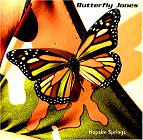 Butterfly Jones is a new band that might sound familiar to fans of early-90s alternative rock – the group’s core is guitarist/vocalist/songwriter Michael Gurley and drummer/songwriter Phil Leavitt, two-thirds of the band dada. They bring their guitar-driven alt-rock sound to Butterfly Jones, with up-tempo songs that charge forward with great enthusiasm and thoughtful ballads that don’t go overboard on the emotion.
Butterfly Jones is a new band that might sound familiar to fans of early-90s alternative rock – the group’s core is guitarist/vocalist/songwriter Michael Gurley and drummer/songwriter Phil Leavitt, two-thirds of the band dada. They bring their guitar-driven alt-rock sound to Butterfly Jones, with up-tempo songs that charge forward with great enthusiasm and thoughtful ballads that don’t go overboard on the emotion.
Standout songs on the album include “Suicide Bridge”, which has some excellent work on violin, viola and cello. Like many of the songs on the album, Bridge tiptoes on the line dividing hope and despair, with the narrator daring to lean toward hope – the bridge says, “In an instance everything can turn around / In an instance everything is lost / And all is found.”
“The Systematic Dumbing Down Of Terry Constance Jones” is a little bit odd, as Gurley gives a first-person perspective of the title character changing her ambitions to fit society’s expectations – it’s a very smart song, and I like it a lot, but I don’t know if people will find it presumptuous that Gurley would assume to speak for women in this way. I hope not.
“Are We In Love Again” ought to be the theme song for every on-again/off-again relationship, and is darned catchy besides. I particularly like the chorus, in which the title phrase alternates with quick yes-or-no questions that bounce between the yes-I- love-you-no-I-can’t-stand-you extremes that have the narrator so confused. Gurley’s vocals, solid throughout the album, really shine here.
love-you-no-I-can’t-stand-you extremes that have the narrator so confused. Gurley’s vocals, solid throughout the album, really shine here.
These three songs are probably my favorites on the disc, but there’s not a bad song on the album. Definitely worth a listen or five.
- Napalm Springs (4:19)
- Suicide Bridge (4:25)
- Anywhere But Now (3:44)
- Sophie (3:05)
- Alright (6:01)
- Are We In Love Again (3:28)
- Wonder (3:13)
- Sunshine And Ecstacy (2:43)
- Blue Roses (4:06)
- The Systematic Dumbing Down Of Terry Constance Jones (3:43)
- When People Are Mean (2:44)
- It’s Cool Dude (4:15)
- Dreamtime (3:12)
- Please (3:05)
Released by: Vanguard
Release date: 2001
Total running time: 47:12
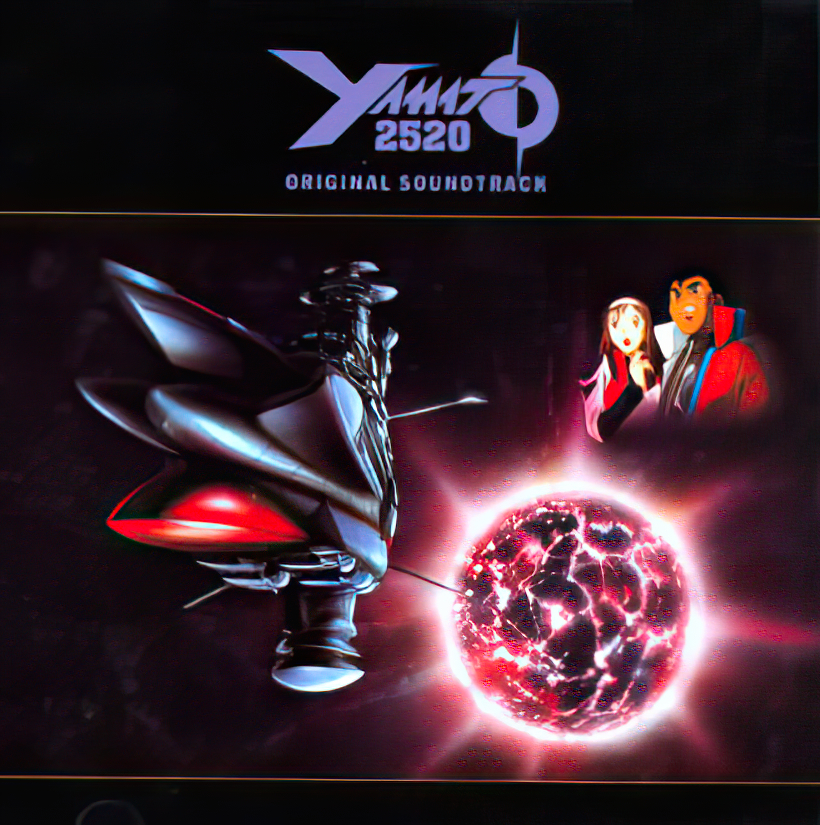
Yamato 2520 – music by David Mathes and Kentarou Hata
In 1995, without the help of Leiji Matsumoto, who was instrumental in the creation of the original Space Battleship Yamato, Yoshinobu Nishizaki tried to launch a “Yamato: The Next Generation” of sorts, Yamato 2520, set 100 years after the original Yamato’s adventures came to a fiery end. With no concrete connection to the original Yamato characters or settings – i.e., no mention of the Gamilons, Iscandar, or the Comet Empire – the series chronicled the voyages of a small group of young people from a divided future Earth who discover the plans for the original Yamato, and use them to build a ship that manages to look almost completely unlike it.
The show lasted only six episodes before production and financial difficulties closed up the animation shop, and creator Nishizaki later wound up in prison, leaving former partner Matsumoto to take the reigns of the Yamato license and the franchise. Many fans now regard Yamato 2520 as a curiosity, and not part of the main Yamato saga (not unlike the second Yamato movie, which killed off the entire crew!).
Not helping matters much is the music. Though some of it is quite nice in its own way, there is once again no connection to the Yamato sound of old. Hiroshi Miyagawa’s sweeping, epic music helped to define the original series with pounding martial action music, dreamily romantic pieces with a lyrical quality, and even a little  edge of 70s funk. The original Yamato music isn’t even so much as quoted here, with the Yamato 2520 score favoring modern-day synth precision, and frankly it’s dull in places. It’s not a total loss, but like the short-lived series from which it originated, the Yamato 2520 soundtrack fails to live up to the legacy to which it would inevitably (and yes, perhaps unfairly) be compared.
edge of 70s funk. The original Yamato music isn’t even so much as quoted here, with the Yamato 2520 score favoring modern-day synth precision, and frankly it’s dull in places. It’s not a total loss, but like the short-lived series from which it originated, the Yamato 2520 soundtrack fails to live up to the legacy to which it would inevitably (and yes, perhaps unfairly) be compared.
- Track 1 (2:57)
- Track 2 (4:49)
- Track 3 (3:36)
- Track 4 (4:17)
- Track 5 (5:29)
- Track 6 (2:48)
- Track 7 (5:09)
- Track 8 (3:55)
- Track 9 (2:43)
- Track 10 (5:54)
- Track 11 (2:49)
- Track 12 (4:35)
- Track 13 (3:30)
(Track titles on this disc were entirely in Japanese.)
Released by: Sony Music Japan
Release date: 1995
Total running time: 52:39
Roy Wood – Mustard
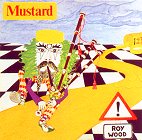 Following up on the not-quite-success of his amazing 1973 solo debut Boulders and some equally underground releases (commercial-success-wise, that is) with his band Wizzard, ELO co-founder Roy Wood regrouped and decided to do another truly solo album. Woody can play a few dozen instruments, you see, so locking this guy into a recording studio by himself for a few weeks with a fresh batch of songs is not a problem. What he emerged with, while not quite up to the innovation level of Boulders, is still stunning.
Following up on the not-quite-success of his amazing 1973 solo debut Boulders and some equally underground releases (commercial-success-wise, that is) with his band Wizzard, ELO co-founder Roy Wood regrouped and decided to do another truly solo album. Woody can play a few dozen instruments, you see, so locking this guy into a recording studio by himself for a few weeks with a fresh batch of songs is not a problem. What he emerged with, while not quite up to the innovation level of Boulders, is still stunning.
I have to admit a certain level of amazement with those gifted individuals who can play it all for themselves, and Roy Wood is among the most amazing of those musical hermit crabs. Who else could get away with using bagpipes in an intro to an all-out 70s style rocker? And actually play the bloody things himself?
That’s not the only stylistic innovation on Mustard; on two tracks – the title track intro and “You Sure Got It Now” – Wood does an uncanny vocal impersonation of the Andrews Sisters, complete with scratchy-record effects on the former. The latter overlays that all-female trio sound on a somewhat bluesier, rockier rhythm track, and it works in a weird, cultural-collision sort of way. And keep in mind, it’s all Roy Wood’s vocals. (The only guest vocals are Phil Everly – yes, as in the Everly Brothers, who coincidentally later had a song produced by Wood’s former ELO cohort Jeff Lynne – on “Get On Down Home” and Annie Haslam singing higher backing vocals on the excellent ballad “The Rain Came Down”.)
The highlight for me is easily “The Song”, which slowly unfolds into a lovely instrumental in its second half, and it’s easy to tell that the starting point for the song’s sound – if not the music itself – was The Beatles’ “She’s Leaving Home”.
This being a 1999 CD reissue, fully half of the tracks are added bonuses from non-album singles and B-sides (the original Mustard ended with “Get On Down Home”), including the sitar-heavy “Bengal Jig”, and some more of the 50s-style rockers which Wood has made part of his unique style – “Oh What A Shame”  and “The Rattlesnake Roll”. An ELO-worthy instrumental with equal helpings of sax and Moog synthesizer, “Strider”, is also included, as are some very interesting liner notes placing Wood’s work into the context of British rock history and what other acts were doing at roughly the same time. A highly recommended package for fans of Woody’s work – or even for those unfamiliar with it.
and “The Rattlesnake Roll”. An ELO-worthy instrumental with equal helpings of sax and Moog synthesizer, “Strider”, is also included, as are some very interesting liner notes placing Wood’s work into the context of British rock history and what other acts were doing at roughly the same time. A highly recommended package for fans of Woody’s work – or even for those unfamiliar with it.
- Mustard (1:27)
- Any Old Time Will Do (4:12)
- The Rain Came Down On Everything (6:34)
- You Sure Got It Now (5:29)
- Why Does A Pretty Girl Sing Those Sad Songs (4:32)
- The Song (6:35)
- Look Thru The Eyes Of A Fool (2:55)
- Interlude (1:24)
- Get On Down Home (7:29)
- Oh What A Shame (3:50)
- Bengal Jig (2:13)
- Rattlesnake Roll (4:01)
- Can’t Help My Feelings (5:11)
- Strider (2:49)
- Indiana Rainbow (3:53)
- The Thing Is This (This Is The Thing) (5:43)
Released by: Edsel Records
Release date: 1975 (reissued in 1999)
Total running time: 68:39
John Mayer – Room For Squares
 John Mayer’s Room For Squares ranks as one of my most fortunate musical finds; Mayer opened for former Toad The Wet Sprocket frontman Glen Phillips on a recent acoustic tour, and shortly after Philadelphia radio station WXPN started rather heavy airplay of the album’s first single, “No Such Thing”. I eventually decided to buy the CD, and now I’m hooked. The guitar line and percussion do a great job carrying the basic melodies, whether they’re slower, somewhat dreamy tunes like “Your Body Is a Wonderland” and “City Love” or more energetic songs such as “Love Song For No One” and “No Such Thing”. Meyer then builds around those melodies with organs, pianos, violins and other instrumentation to create a sound that’s very light but still rich enough to engage the listener. He can use a few notes to perfectly capture a particular emotion, and let that emotion color the rest of the song. “3×5” is a song about a traveler whose experiences reconnect him to the world, and the simple fragment that connects the verses seems to sum up the gravity of such a moment.
John Mayer’s Room For Squares ranks as one of my most fortunate musical finds; Mayer opened for former Toad The Wet Sprocket frontman Glen Phillips on a recent acoustic tour, and shortly after Philadelphia radio station WXPN started rather heavy airplay of the album’s first single, “No Such Thing”. I eventually decided to buy the CD, and now I’m hooked. The guitar line and percussion do a great job carrying the basic melodies, whether they’re slower, somewhat dreamy tunes like “Your Body Is a Wonderland” and “City Love” or more energetic songs such as “Love Song For No One” and “No Such Thing”. Meyer then builds around those melodies with organs, pianos, violins and other instrumentation to create a sound that’s very light but still rich enough to engage the listener. He can use a few notes to perfectly capture a particular emotion, and let that emotion color the rest of the song. “3×5” is a song about a traveler whose experiences reconnect him to the world, and the simple fragment that connects the verses seems to sum up the gravity of such a moment.
Meyer’s lyrics may be even more accomplished than the music. He has a sense of humor about himself and the world that doesn’t prevent him from being emotionally honest and insightful; at his best, he combines the two sides. “83”‘s nostalgia is summed up in the closing “whatever happened to my lunchbox / when came the day that it got thrown away / and don’t you think I should have had some say / in that decision?” And I don’t think anyone could come up with a better follow-your-heart exhortation than “No Such Thing”, where he says, “I want to scream at the top of my lungs/I just found out there’s no such thing as the real world/Just a lie you’ve  got to rise above.” (Meyer delivers the phrase “at the top of my lungs” in a high-pitched call that somehow sounds good while still inspiring the tone-deaf among us to sing along in delight.) Direct and witty at the same time, Room For Squares is an outstanding example of intelligent songwriting, and I can only hope it finds the audience it deserves.
got to rise above.” (Meyer delivers the phrase “at the top of my lungs” in a high-pitched call that somehow sounds good while still inspiring the tone-deaf among us to sing along in delight.) Direct and witty at the same time, Room For Squares is an outstanding example of intelligent songwriting, and I can only hope it finds the audience it deserves.
- No Such Thing (3:51)
- Why Georgia (4:28)
- My Stupid Mouth (3:45)
- Your Body Is A Wonderland (4:09)
- Neon (4:22)
- City Love (4:00)
- 83 (4:50)
- 3×5 (4:50)
- Love Song For No One (3:21)
- Back To You (4:01)
- Great Indoors (3:36)
- Not Myself (3:40)
- St. Patrick’s Day (5:21)
Released by: Columbia
Release date: 2001
Total running time: 54:21
Y Kant Tori Read
 Truly a legendary album, Y Kant Tori Read’s debut (and thankfully only) album appeared and disappeared from the Billboard charts in the summer of 1988 within the space of a month – and no one heard from the band again until one of its members, pianist/vocalist Tori Amos, resurfaced as a solo artist at the forefront of a whole new movement of female artists in 1991.
Truly a legendary album, Y Kant Tori Read’s debut (and thankfully only) album appeared and disappeared from the Billboard charts in the summer of 1988 within the space of a month – and no one heard from the band again until one of its members, pianist/vocalist Tori Amos, resurfaced as a solo artist at the forefront of a whole new movement of female artists in 1991.
Before the life-altering events that inspired Little Earthquakes, Amos’ first solo project, happened, she was fronting Y Kant Tori Read, essentially a typical late-80s rock group with a very typical late-80s sound. Those expecting to hear Tori’s trademark melancholy, introspective sound…won’t. But thanks to its abysmal chart performance and its small pressing, Y Kant Tori Read sank into oblivion – until Tori Amos became a household name in the early 90s, which sent the value of any original LP, CD or cassettes of Y Kant Tori Read skyrocketing into the $100 range and beyond. (This has also made it one of the single most bootlegged music releases ever – and even the bootlegs fetch ridiculous prices on eBay.) Legend has it that Tori’s solo contract with Atlantic Records prevents the label from reissuing the album in any form.
And that’s a good thing. Despite the fact that I haven’t been enthralled with everything Tori’s unleashed, Y Kant Tori Read is not a testament to her talents that I’d want released again were I her.
Well, it’s a good thing with the exception of one song.
 “Etienne Trilogy” is a linked cycle of two instrumentals sandwiching an absolutely beautiful vocal/piano number which lives up to anything Tori has ever done since. In fact, I’d put “Etienne” up there with “Winter”, “Cloud On My Tongue” and “Sugar”, some of the best stuff she has ever done. You will not be disappointed.
“Etienne Trilogy” is a linked cycle of two instrumentals sandwiching an absolutely beautiful vocal/piano number which lives up to anything Tori has ever done since. In fact, I’d put “Etienne” up there with “Winter”, “Cloud On My Tongue” and “Sugar”, some of the best stuff she has ever done. You will not be disappointed.
- The Big Picture (4:11)
- Cool On Your Island (4:50)
- Fayth (4:18)
- Fire On The Side (4:48)
- Pirates (4:15)
- Floating City (5:03)
- Heart Attack At 23 (5:10)
- On The Boundary (4:30)
- You Go To My Head (3:46)
- Etienne Trilogy (6:28)
The Highlands / Etienne / Skyeboat SongReleased by: Atlantic
Release date: 1988
Total running time: 59:41
Paul McCartney – Driving Rain
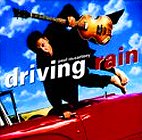 Wow, it’s finally happened – Paul McCartney, whose last project I really dug was 1997’s Flaming Pie, has been dragged into the 90s. Not a bad trick, considering that this album was released in 2001.
Wow, it’s finally happened – Paul McCartney, whose last project I really dug was 1997’s Flaming Pie, has been dragged into the 90s. Not a bad trick, considering that this album was released in 2001.
I was pleasantly surprised by Driving Rain, having been bitterly disappointed by the retro-cover-fest that was Run Devil Run. And one of the things that I believe surprised many people about Driving Rain was the fresh frankness of the lyrics, dealing openly with McCartney’s second marriage following his first wife’s death due to cancer. But while the subject matter is a bit different for the former Beatle, his way with a pop song isn’t. Tunes like “Your Way”, “Magic” and “Driving Rain” demonstrate his melodic gift, complete with trademark hooks.
Songs like “Spinning On An Axis” and “She’s Given Up Talking”, however, introduce something new to the equation – a bit of modern groove and a much more modern sound production-wise. These things aren’t unwelcome, and I felt the number of songs given this treatment wasn’t overpowering. You won’t be wondering why Sir Paul suddenly changed his entire sound – because he hasn’t.
“Riding Into Jaipur” is the kind of Indian-flavored tune we might have expected from the late George Harrison, while “Heather” turns out to be another surprise, with a lengthy instrumental jam eventually leading up to a single verse song. “Rinse The Raindrops” is also mostly instrumental, and clocking in at ten or so minutes with its atmosphere of a nice loose jam, it would’ve made a nice album closer. But as most people know by now, it’s not the album closer – that honor goes to the hurriedly-written song “Freedom”, which addresses the September 11th, 2001 terrorist attacks on the U.S. in what I can most charitably describe as a token manner,  with jingoistic, repetetive lyrics that don’t really rise to the challenge of addressing the momentous events that inspired them. Honestly, I would’ve rather he’d ended Driving Rain with “Rinse The Raindrops”, or perhaps moved the “No More Lonely Nights”-esque “Your Loving Flame” down to end the album; “Freedom” is, in itself, hardly a song befitting the occasion, and not as good as the rest of the album.
with jingoistic, repetetive lyrics that don’t really rise to the challenge of addressing the momentous events that inspired them. Honestly, I would’ve rather he’d ended Driving Rain with “Rinse The Raindrops”, or perhaps moved the “No More Lonely Nights”-esque “Your Loving Flame” down to end the album; “Freedom” is, in itself, hardly a song befitting the occasion, and not as good as the rest of the album.
- Lonely Road (3:15)
- From A Lover To A Friend (3:48)
- She’s Given Up Talking (4:57)
- Driving Rain (3:26)
- I Do (2:55)
- Tiny Bubble (4:20)
- Magic (3:57)
- Your Way (2:54)
- Spinning On An Axis (5:15)
- About You (2:53)
- Heather (3:24)
- Back In The Sunshine Again (4:21)
- Loving Flame (3:42)
- Riding Into Jaipur (4:06)
- Rinse The Raindrops (10:11)
- Freedom (3:31)
Released by: Capitol
Release date: 2001
Total running time: 66:55
Jewel – This Way
 Love her or hate her, Jewel is back. I admit to liking quite a bit – but not all – of Jewel’s past work, but I can also see where there’s a bit of pop culture backlash against her trying-almost-too-hard-to-be-earnest style. And to some degree, wisely, she sheds some – but not all – of that style in her latest album.
Love her or hate her, Jewel is back. I admit to liking quite a bit – but not all – of Jewel’s past work, but I can also see where there’s a bit of pop culture backlash against her trying-almost-too-hard-to-be-earnest style. And to some degree, wisely, she sheds some – but not all – of that style in her latest album.
“Standing Still”, which also led the album as its first single, starts things off with a burst of raw energy which carries Jewel firmly out of the wanna-be folkster category and into rock ‘n’ roll territory. Some might be a bit dubious about this transition, but she actually carries it off well – her voice is capable of pulling it off respectably.
Other standout tracks include L”ove Me, Just Leave Me Alone”, “Serve The Ego”, and “Everybody Needs Someone Sometime”, all of which feature something of the same rocky feel as “Standing Still” to varying degrees. On other tracks, such as “Break Me”, Jewel retains her signature style, proving for the doubters that perhaps she hasn’t changed as much as you might think.
Overall, there’s actually a pretty good balance of new Jewel and old Jewel, stylistically speaking, and there are even a few live tracks thrown in at the end of the album just to mix things up even more. Still, there’s something missing – the ballads don’t come close to reaching the eloquence of “Amen” or “Deep Water”, and the rockier numbers somehow aren’t on the same plateau as, say, “Down So Long” or “Who Will Save Your Soul”. It’s just possible that Jewel has run out of inspiration and is falling back on old tricks to fill things out. The  press material for This Way made a point of telling us that Jewel had been burned out on touring and promotions during the publicity trail for her second album, and retreated from performing for a while to recoup her energies; This Way, while certainly listenable in places, comes across as a bit hollow both musically and lyrically. Maybe Jewel wasn’t quite ready to come back.
press material for This Way made a point of telling us that Jewel had been burned out on touring and promotions during the publicity trail for her second album, and retreated from performing for a while to recoup her energies; This Way, while certainly listenable in places, comes across as a bit hollow both musically and lyrically. Maybe Jewel wasn’t quite ready to come back.
- Standing Still (4:29)
- Jesus Loves You (4:20)
- Everybody Needs Someone Sometime (4:08)
- Break Me (4:03)
- Do You Want To Play? (2:55)
- Till We Run Out Of Road (4:45)
- Serve The Ego (4:57)
- This Way (4:16)
- Cleveland (4:09)
- I Won’t Walk Away (4:46)
- Love Me, Just Leave Me Alone (3:47)
- The New Wild West (5:05)
- Grey Matter (4:40)
- Sometimes It Be That Way (4:21)
Released by: Atlantic
Release date: 2001
Total running time: 59:41
The Move – The BBC Sessions
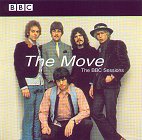 When some of the tracks on the two volumes of ELO BBC recordings – Live At The BBC and The BBC Sessions – were exactly the same as the final versions that appeared on their albums, I had a few trepidations about picking up yet another BBC Sessions album. As it turns out, The Move: The BBC Sessions features some dandy rarities I’d never heard before, most of them taking the form of cover songs that haven’t appeared on previous collections.
When some of the tracks on the two volumes of ELO BBC recordings – Live At The BBC and The BBC Sessions – were exactly the same as the final versions that appeared on their albums, I had a few trepidations about picking up yet another BBC Sessions album. As it turns out, The Move: The BBC Sessions features some dandy rarities I’d never heard before, most of them taking the form of cover songs that haven’t appeared on previous collections.
Some not-quite-finished session takes of some classic Move chestnuts are included here, from “Flowers In The Rain” to “Night Of Fear” to “Blackberry Way”, and while they’re not as polished as the final album cuts, it’s interesting to hear a slightly different spin on them.
 Some of the covers are real gem, and reveal The Move’s legendary live act – “Stop, Get A Hold Of Myself” and “Morning Dew” are among the highlights of the covers.
Some of the covers are real gem, and reveal The Move’s legendary live act – “Stop, Get A Hold Of Myself” and “Morning Dew” are among the highlights of the covers.
If you can find it, The Move: The BBC Sessions is worth tracking down for Move completists and even not-so-completists.
- You’d Better Believe Me (3:00)
- Night Of Fear (2:23)
- Stop, Get A Hold Of Myself (2:35)
- Kilroy Was Here (2:40)
- Walk On The Water (3:04)
- I Can Hear The Grass Grow (3:18)
- Morning Dew (2:43)
- Flowers In The Rain (2:20)
- So You Wanna Be A Rock ‘N’ Roll Star (2:55)
- Stephanie Knows Who (2:32)
- Cherry Blossom Clinic (2:26)
- Hey Grandma (3:04)
- Fire Brigade (2:17)
- Weekend (1:52)
- It’ll Be Me (2:32)
- Useless Information (2:46)
- Kentucky Woman (2:28)
- Higher And Higher (3:10)
- Long Black Veil (2:53)
- Wild Tiger Woman (2:33)
- Piece Of My Heart (3:03)
- Blackberry Way (3:08)
- Going Back (2:50)
- California Girls (3:08)
- Christian Life (2:02)
Released by: BBC Music / Strange Fruit
Release date: 1998
Total running time: 67:42
Jason Falkner – Bedtime With The Beatles
 We’ve been awaiting something new from Jason Falkner since his second solo album. But while some diehard fans may have felt Bedtime With The Beatles was a misstep for their favorite practitioner of power pop, it does serve as something that, perhaps, another all-original solo project wouldn’t have done: it’s a testament not only to the enduring power of the Lennon/McCartney catalog, but also to Falkner’s incredible musicianship.
We’ve been awaiting something new from Jason Falkner since his second solo album. But while some diehard fans may have felt Bedtime With The Beatles was a misstep for their favorite practitioner of power pop, it does serve as something that, perhaps, another all-original solo project wouldn’t have done: it’s a testament not only to the enduring power of the Lennon/McCartney catalog, but also to Falkner’s incredible musicianship.
Falkner is known for playing virtually everything on his solo albums himself, and this album is no exception, with the only session musicians manning classical string instruments. The album’s packaging hypes it as a lullaby album, suitable for singing baby to sleep, and indeed it is quite relaxing; the webmaster’s cats dozed off listening to it pretty quickly. But those who stay awake can marvel at the intricate new arrangements. Beatles tunes have long been fodder for instrumentals, but this isn’t elevator music. It may be slowed down, but the sheer beauty revealed in some of the songs is staggering.
The album opens with “Blackbird”, the original version of which I’ll fess up to not particularly liking, and which I have to admit may even be the best track on the entire disc. Some of the others songs are among my personal favorites in the Beatles’ repertoire: “Across The Universe”, “Here, There And Everywhere”, “And I  Love Her” and “I’m Only Sleeping”, which in particular has an appropriately dreamy quality.
Love Her” and “I’m Only Sleeping”, which in particular has an appropriately dreamy quality.
Lyrics are included for those who literally do want to make a lullaby out of the Beatles classics…and those of us who still have our eyes open at the end of “The Long And Winding Road” sincerely hope that Jason Falkner will find some time in his schedule to do another Bedtime With The Beatles album.
- Blackbird (3:36)
- Across The Universe (4:07)
- And I Love Her (3:07)
- I’m Only Sleeping (4:11)
- If I Fell (3:43)
- The Fool On The Hill (3:46)
- Mother Nature’s Son (2:51)
- Michelle (3:14)
- Here, There And Everywhere (3:53)
- In My Life (3:25)
- The Long And Winding Road (3:58)
Released by: Sony Wonder
Release date: 2001
Total running time: 40:09
Lynne Me Your Ears: Tribute To The Music Of Jeff Lynne
 The premise of this double-disc compilation is simple: various modern pop artists, most of them enjoying cult indie label status (and a few of them refugees from major labels too), revisit the songs of one of their musical heroes, ELO’s Jeff Lynne. Colorado’s own Not Lame Records has been teasing the heck out of this release for months, only to watch it be bogged down by politics (the father/son duo of Randy and Tal Bachman, each of whom were originally slated to contribute a song, pulled out) and delays (a printing error in the first run of liner notes booklets which caused the collection to slip well past its original pre-Christmas 2001 release date). And now that it’s here, was it worth the lengthy wait?
The premise of this double-disc compilation is simple: various modern pop artists, most of them enjoying cult indie label status (and a few of them refugees from major labels too), revisit the songs of one of their musical heroes, ELO’s Jeff Lynne. Colorado’s own Not Lame Records has been teasing the heck out of this release for months, only to watch it be bogged down by politics (the father/son duo of Randy and Tal Bachman, each of whom were originally slated to contribute a song, pulled out) and delays (a printing error in the first run of liner notes booklets which caused the collection to slip well past its original pre-Christmas 2001 release date). And now that it’s here, was it worth the lengthy wait?
The answer is, in most cases, absolutely. The covers (which don’t limit themselves to ELO material but also cover Lynne’s contributions to the Traveling Wilburys, a 1960s U.K. group known as the Idle Race, and his solitary solo album) vary wildly, ranging from faithful homages to reinterpretations in a completely new style.
Some of the better “near-beer” covers include former R.E.M. producer Mitch Easter’s collaboration with Bobby Sutliff on the first ELO single, “10538 Overture”; Michael Carpenter’s near-carbon-copy of Lynne’s solo single “Every Little Thing”; Jason Falkner’s raw cover of “Do Ya”, a stripped-down, Buddy Holly-ized cover of “Rock ‘N’ Roll Is King” by Walter Clevenger and the Dairy Kings, and an accurate-down-to-the-overmodulation-distortion copy of the Idle Race’s “Morning Sunshine” by Jeremy.
The real triumphs of Lynne Me Your Ears, however, are those artists who took extensive liberties and created something completely new – Ross Rice’s hip-hop-ified cover of “Evil Woman” is both funky and up-to-date, and Tony Visconti (former Move and Moody Blues producer) turns in a tasty new take on “Mr. Blue Sky”, starting out as a rap and then tumbling through every style in the book by the end of the song’s lengthy instrumental coda. Prairie Sons and Daughters transform the eloquence of “One Summer Dream” into a spiky, guitar-drenched masterpiece that also takes a detour into “In Old England Town” from ELO’s second album. That multiple-song-tributes-in-a-single-track trick is repeated masterfully by Rick Altizer, who leaps from the soulful opening guitar solo of “Laredo Tornado” into a thundering modernized version of “Boy Blue”. Former Move vocalist Carl Wayne, ironically, takes the stage-musical feel of “Steppin’ Out” to its logical, grandiose conclusion (it was Wayne who stepped out of the Move in 1970, a departure that made way for Jeff Lynne to join the group). The Shazam squeezes the synths out of “Twilight” and turns it into a wonderful wash of electric guitar work (but keeps the harmonies intact), and “Turn To Stone” gets a similar treatment from Roger Klug. Sparkle*Jets UK turn the dreamy “Above The Clouds” into a cheerful, rockin’ power pop number.
Perhaps the most shocking transformation bestowed upon any of the songs here is “On The Run”, a rapid-fire techno-before-there-was-techno tune from 1979’s Discovery which is rendered here by Sixpence None The Richer as a relaxing acoustic piece with a slow, majestic gait and Leigh Nash’s always pleasant voice. It has to be heard to be believed – this may be the best example on Lynne Me Your Ears of a band taking one of the old ELO chestnuts and making it their own.
There are a small number of misses for all of those hits, however; Peter Holsapple’s cover of the Move’s “No Time” has yet to click with me – the harmonies seem to be a misfire in some places. The Heavy Blinkers’ cover of “You Took My Breath Away”, itself a Roy Orbison tribute penned by Lynne for the second Traveling Wilburys album, lacks the melancholy of the original and comes out sounding a little too sunny. And the “Sweet Is The Night” cover heard here seems to have lost a lot of what made the original so appealing.
 Overall, however, a nice treat for ELO/Lynne fans, and hey, your mileage may even vary on which songs worked and which ones didn’t. Highly recommended – and, in the face of Sony’s recent reticence to continue the promised remastering of the entire ELO catalogue, it may be the last ELO related treat we fans get for quite a while. Soak it up slowly and enjoy.
Overall, however, a nice treat for ELO/Lynne fans, and hey, your mileage may even vary on which songs worked and which ones didn’t. Highly recommended – and, in the face of Sony’s recent reticence to continue the promised remastering of the entire ELO catalogue, it may be the last ELO related treat we fans get for quite a while. Soak it up slowly and enjoy.
Disc one
- 10538 Overture – Bobby Sutliff & Mitch Easter (4:35)
- Ma Ma Ma Belle – Earl Slick (4:05)
- Telephone Line – Jeffrey Foskett (4:49)
- Do Ya – Jason Falkner (3:58)
- Sweet Is The Night – Ben Lee (3:28)
- Rockaria! – Pat Buchanan (3:49)
- Every Little Thing – Michael Carpenter (3:52)
- No Time – Peter Holsapple (3:59)
- Showdown – Richard Barone (4:26)
- Handle With Care – Jamie Hoover (3:25)
- Strange Magic – Mark Helm (3:54)
- Evil Woman – Ross Rice (4:51)
- Steppin’ Out – Carl Wayne (4:27)
- Don’t Bring Me Down – SWAG (3:13)
- One Summer Dream – Prairie Sons & Daughters (7:16)
- Can’t Get It Out Of My Head – Doug Powell (4:57)
Disc two
- Twilight – The Shazam (3:11)
- Mr. Blue Sky – Tony Visconti (5:02)
- You Took My Breath Away – The Heavy Blinkers (3:07)
- Message From The Country – The Balls of France (4:28)
- The Minister – Ferenzik (4:43)
- Xanadu – Neilson Hubbard and Venus Hum (3:31)
- When Time Stood Still – Bill Lloyd (3:27)
- Above The Clouds – Sparkle*Jets UK (4:00)
- Rock And Roll Is King – Walter Clevenger and the Dairy Kings (3:14)
- Morning Sunshine – Jeremy (2:19)
- Boy Blue – Rick Altizer (3:45)
- Livin’ Thing – Pray For Rain (3:57)
- On The Run – Sixpence None The Richer (2:37)
- Bluebird Is Dead – Todd Rundgren (5:06)
- Turn To Stone – Ruger Klug (5:11)
- Eldorado – Fleming and John (6:41)
Released by: Not Lame Records
Release date: 2002
Disc one total running time: 69:04
Disc two total running time: 64:19
Electric Light Orchestra – First Light

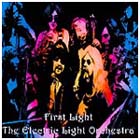 In the late 60s, one would’ve been hard-pressed to find a post-Beatles psychedelic power pop outfit more prominent in Britain than The Move. (How prominent? One of their singles was the first song played on BBC Radio 1.) So naturally, the members of the Move would’ve been crazy to knock a sure thing in the head and try something as drastically different as a live rock group with its own string section.
In the late 60s, one would’ve been hard-pressed to find a post-Beatles psychedelic power pop outfit more prominent in Britain than The Move. (How prominent? One of their singles was the first song played on BBC Radio 1.) So naturally, the members of the Move would’ve been crazy to knock a sure thing in the head and try something as drastically different as a live rock group with its own string section.
Fortunately for us, Roy Wood and newcomer Jeff Lynne were crazy enough to do just that. Frequently quoted as “picking up where ‘I Am The Walrus’ left off,” Wood and Lynne dared to throw layer after layer of cello on top of Lynne’s latest composition, “10538 Overture”, which was originally slated to be a Move B-side. The result thrilled them enough to continue forging ahead with their neoclassical aspirations in mind, and the songs grew more adventurous from there; “The Battle Of Marston Moor” has no rock elements at all, adding Wood’s historical spoken narrative to a largely baroque backing. “Whisper In The Night” adds layers of cellos and an angelic choir to a fairly simple ballad. Lynne’s “Mr. Radio” strives for an old-time radio sound, featuring no bass whatsoever (but plenty of cellos).
First Light is a 2-CD celebration of the band’s first album, dating back to 1971 (whose original no-frills single-CD release has been reviewed here previously). Remastered from the original session tapes, the original album tracks have never sounded better, and yet the cleaning-up of the material doesn’t strip it of its heady early 70s charm. A new version of the album, brought up to modern specs, would be worth the price of admission alone, but bonus tracks fill out both the CD containing the original album and and entire second CD. Some of the stuff – the incredibly rare live tracks from one of the group’s earliest performances, alternate takes of several songs from the album – is priceless. The live version of a song known only by the title “Jeff’s Boogie No. 2” (later heard on the group’s second album under the title “In Old England Town”) is particularly fascinating, with wildly different lyrics than what eventually accompanied that music. And the live “Whisper In The Night”, minus the cellos and choir but with a helping hand from the other band members’ more traditional instruments, is also worth a listen. And just for the record, I want to know who on Earth recorded the BBC Radio intros to the second disc’s two different versions of “10538 Overture” – who thought to keep that stuff!?
Both discs included copious liner notes booklets, with comments from Lynne and Wood and tons of photos. The first disc is also filled out with an extensive multimedia CD-ROM section featuring the session logs, the band’s discography, and even the rare promotional video from “10538 Overture”.
 Overall, it’s a grand package for those already acquainted with the first album, or those interested in ELO’s beginnings. Sadly, only a few thousand copies of the two-disc Limited Edition have been made, and the title reverts to the first disc only after that. If ELO is up your alley, spring for the deluxe edition while it’s there.
Overall, it’s a grand package for those already acquainted with the first album, or those interested in ELO’s beginnings. Sadly, only a few thousand copies of the two-disc Limited Edition have been made, and the title reverts to the first disc only after that. If ELO is up your alley, spring for the deluxe edition while it’s there.
Disc one:
- 10538 Overture (5:37)
- Look At Me Now (3:20)
- Nellie Takes Her Bow (6:02)
- The Battle Of Marston Moor (July 2nd, 1644) (6:05)
- First Movement (Jumping Biz) (3:03)
- Mr. Radio (5:06)
- Manhattan Rumble (49th Street Massacre) (4:25)
- Queen Of The Hours (3:25)
- Whisper In The Night (4:49)
- The Battle Of Marston Moor – alternate take (1:00)
- 10538 Overture – alternate take (5:48)
Disc two:
- Brian Matthews Introduces ELO (0:37)
- 10538 Overture – acetate version (5:24)
- Look At Me Now – quadrophonic mix (3:19)
- Nellie Takes Her Bow – quadrophonic mix (5:59)
- The Battle Of Marston Moor – quadrophonic mix (5:55)
- Jeff’s Boogie No. 2 – live (6:58)
- Whisper In The Night – live (5:45)
- Great Balls Of Fire – live (5:40)
- Queen Of The Hours – quadrophonic mix (3:18)
- Mr. Radio – Take 9 (5:18)
- 10538 Overture – BBC Sessions version (10:39)
(includes Whisper In The Night – BBC Sessions version as “hidden track”)Released by: EMI/Harvest
Release date: 2001
Disc one total running time: 48:40
Disc two total running time: 58:52
Afro-Celt Sound System – Volume 2: Release
 Coming off of what could have been a glorious one-off experiment, the Afro-Celts decided to grab for a little more exposure by starting what has now become a tradition in their work: high-profile guest artists. None other than Sinead O’Connor kicks the proceedings off with her compassionate vocal for “Release”, for which she also wrote the anti-violence lyrics (the album is bookended with an instrumental version of “Release” as the last track, and O’Connor’s credit is the only one missing among the songwriters).
Coming off of what could have been a glorious one-off experiment, the Afro-Celts decided to grab for a little more exposure by starting what has now become a tradition in their work: high-profile guest artists. None other than Sinead O’Connor kicks the proceedings off with her compassionate vocal for “Release”, for which she also wrote the anti-violence lyrics (the album is bookended with an instrumental version of “Release” as the last track, and O’Connor’s credit is the only one missing among the songwriters).
If there’s one thing that strikes me upfront about Release, it’s the increase in atmosphere. Songs such as “Èireann”, “Hypnotica” and “Even In My Dreams” are drenched with an almost eerie feel. Most of the tracks top out upward of six and seven minutes, and I’m fine with that – the dense rhythms need time to evolve and develop, else they’d seem a little forced if we were hit over the head with them all at once. But sometimes the atmosphere isn’t about rhythms – it’s about building a tone for the song before the percussion kicks in.
 “Release” and “Amber” really win the prize for being this album’s most relaxing songs, while “Big Cat” and “Riding The Waves” prove the Afro-Celts still have the chops necessary to turn out some hyperkinetic heavyweights that wouldn’t be out of place on the dance floor. In all, a very cohesive collection and most enjoyable.
“Release” and “Amber” really win the prize for being this album’s most relaxing songs, while “Big Cat” and “Riding The Waves” prove the Afro-Celts still have the chops necessary to turn out some hyperkinetic heavyweights that wouldn’t be out of place on the dance floor. In all, a very cohesive collection and most enjoyable.

- Release (7:39)
- Lovers Of Light (4:03)
- Èireann (5:12)
- Urban Aire (2:07)
- Big Cat (7:47)
- Even In My Dreams (7:07)
- Amber (5:27)
- Hypnotica (7:18)
- Riding The Waves (6:36)
- I Think Of… (4:33)
- Release It (instrumental) (6:26)
Released by: Narada RealWorld
Release date: 1999
Total running time: 64:02
Afro-Celt Sound System – Volume 1: Sound Magic
 Serving as a bit of a musical mission statement for Afro-Celt Sound System, their debut effort starts off with two numbers which are still among their strongest: “Saor / Free” and “Whirl-y-Reel 1”. “Sure-As-Not / Sure-As-Knot” wears a bit as it throws in samples of children chanting in its second half, though admittedly that’s just my taste speaking there. The two “Whirl-y-Reel” cuts are a preview of the fast-paced, dense percussion dance tracks that will become the Afro-Celts’
Serving as a bit of a musical mission statement for Afro-Celt Sound System, their debut effort starts off with two numbers which are still among their strongest: “Saor / Free” and “Whirl-y-Reel 1”. “Sure-As-Not / Sure-As-Knot” wears a bit as it throws in samples of children chanting in its second half, though admittedly that’s just my taste speaking there. The two “Whirl-y-Reel” cuts are a preview of the fast-paced, dense percussion dance tracks that will become the Afro-Celts’  specialty in the future, and Sound Magic largely lacks the serene vocals that also become the group’s hallmark in later outings. Still, it’s well worth a listen; recommended tracks include “Whirl-y-Reel 1”, “Inion / Daughter” and “House Of The Ancestors”.
specialty in the future, and Sound Magic largely lacks the serene vocals that also become the group’s hallmark in later outings. Still, it’s well worth a listen; recommended tracks include “Whirl-y-Reel 1”, “Inion / Daughter” and “House Of The Ancestors”.
- Saor / Free / News From Nowhere (8:21)
- Whirl-y-Reel 1 – Beard And Sandals Mix (7:21)
- Inion / Daughter (4:15)
- Sure-As-Not / Sure-As-Knot – Jungle Segue (9:58)
- Nil Cead Againn Dul Abhaile / We Cannot Go Home (7:20)
- Dark Moon, High Tide (4:12)
- Whirl-y-Reel 2 – Folk Police Mix (5:27)
- House Of The Ancestors (8:01)
- Eistigh Sealad / Listen To Me / Saor reprise (10:53)
Released by: RealWorld / Virgin
Release date: 1996
Total running time: 65:48
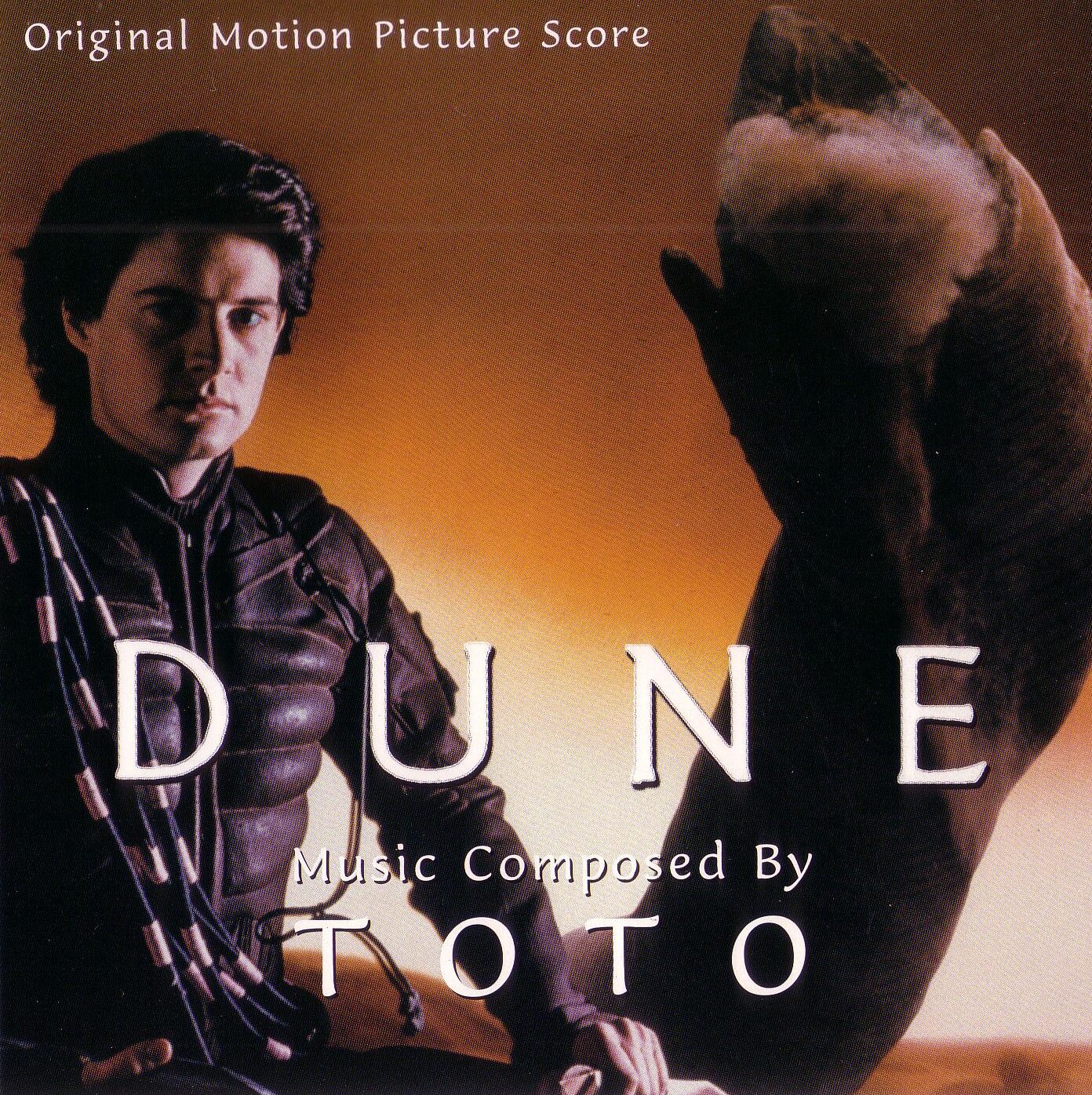
Dune – music by Toto
Not everybody has a soft spot for David Lynch’s 1984 film adaptation of Frank Herbert’s seminal SF novel “Dune”. Maybe it was the acting, or the special effects, or the almost-necessary shortening of the story (to which even the Sci-Fi Channel 2000 miniseries fell victim in different areas), who knows? A canvas as broad and deep as “Dune” doesn’t lend itself easily to film, where a story is expected to be told in under three hours. But the music…well, you may not agree with me here, but the music was almost perfect for the film.
Some film music fans have decried to use of rock-music-as-score in such films as Ladyhawke, but with Dune, the rock group Toto struck a perfect balance, occasionally adding the odd contemporary touch to what was largely an orchestral score augmented by synths and samples. Not bad for 1984, really.
If I have an issue with Toto’s score from Dune, it is that it sometimes drones along, not really developing thematically, which is a potential pitfall encountered anytime a rock musician experiments in a new medium. In places it’s almost annoyingly repetitive, and in other places it’s surprisingly fresh, such as the “Robot Fight” cue. As far as the arrangements and the balance of traditional and modern instruments go, the Dune score is  an excellent mix of old and new, with all the grace of an Alan Parsons instrumental rock opera.
an excellent mix of old and new, with all the grace of an Alan Parsons instrumental rock opera.
One last caveat – there are at least three different versions of this soundtrack available; some have around 20 tracks, while the one I listened to weighed in at 30 tracks. I’m not sure if the longer version is still available.
- Prologue / Main Title (3:20)
- Guild Report (0:55)
- House Atreides (1:44)
- Paul Atreides (2:22)
- Robot Fight (1:23)
- Leto’s Theme (1:47)
- The Box (2:41)
- The Floating Fat Man: The Baron (1:15)
- Departure (1:14)
- Trip To Arrakis (2:37)
- Sandworm Attack (2:52)
- Betrayal / Shields Down (4:31)
- First Attack (2:49)
- The Duke’s Death (2:07)
- Sandworm Chase (2:40)
- The Fremen (3:08)
- Secrets Of The Fremen (2:25)
- Paul Meets Chani (3:08)
- Destiny (2:57)
- Riding The Sandworm (1:27)
- Reunion With Gurney (1:42)
- Prelude: Take My Hand (1:03)
- Paul Takes The Water Of Life (2:52)
- The Sleeper Has Awakened! (3:24)
- Big Battle (3:09)
- Paul Kills Feyd (1:55)
- Final Dream (1:26)
- Dune: Desert Theme (5:33)
- Dune Main Title – demo version (1:26)
- Take My Hand (2:43)
Released by: SuperTracks
Release date: 1997
Total running time: 72:40
Traveling Wilburys – Volume One
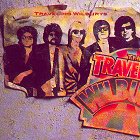 This first outing by the collective of rock legends – Roy Orbison, George Harrison, Bob Dylan, Tom Petty and Jeff Lynne – has attained something of its own legendary status, and listening back to it, it’s not hard to see why.
This first outing by the collective of rock legends – Roy Orbison, George Harrison, Bob Dylan, Tom Petty and Jeff Lynne – has attained something of its own legendary status, and listening back to it, it’s not hard to see why.
The two group efforts, “Handle With Care” and “End Of The Line”, deservedly got a great deal of attention as singles, but there were plenty of other music treasures to be found. “Dirty World” and “Tweeter And The Monkey Man” are obviously Bob Dylan’s babies, while Lynne’s influence is obvious on the retro-rocker “Rattled”. But far and away, the prize on Volume One goes to “Not Alone Anymore”, which was the last thing any of us heard out of Roy Orbison before his death. It was a nice preview of the sound Orbison and Lynne would glean from their collaboration on Orbison’s final solo album Mystery Girl, and took on a bit of a haunting quality in hindsight.
Harrison’s “Heading For The Light” ain’t shabby either…and I think it’s the last song we’ve heard out of him that  really sounds like him, Beatles Anthology “new” songs notwithstanding.
really sounds like him, Beatles Anthology “new” songs notwithstanding.
It’s a bit of fun with a little touch of a country twang to it, and while the follow-up, Volume Three, had its own charms, Orbison’s presence – and, indeed, the presence of the other four rock legends working together for the first time – made Volume One a special outing for the Wilburys.
- Handle With Care (3:20)
- Dirty World (3:30)
- Rattled (3:00)
- Last Night (3:48)
- Not Alone Any More (3:24)
- Congratulations (3:30)
- Heading For The Light (3:37)
- Margarita (3:16)
- Tweeter And The Monkey Man (5:30)
- End Of The Line (3:30)
Released by: Wilbury Records
Release date: 1988
Total running time: 36:25
George Harrison – The Best Of Dark Horse: 1976-1989
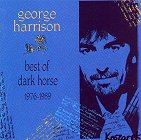 With some of his earliest stuff only just recently becoming available on CD, this George Harrison greatest hits collection is just the ticket for those who don’t feel like trying to track down a bunch of out-of-print vinyl (and the turntable necessary to play it). Though it’s heavy on songs from the Jeff Lynne-produced Cloud Nine, which was only two years old when this CD was originally released, there is a lot of good stuff on here.
With some of his earliest stuff only just recently becoming available on CD, this George Harrison greatest hits collection is just the ticket for those who don’t feel like trying to track down a bunch of out-of-print vinyl (and the turntable necessary to play it). Though it’s heavy on songs from the Jeff Lynne-produced Cloud Nine, which was only two years old when this CD was originally released, there is a lot of good stuff on here.
Personal favorites include “Blow Away” (possibly the best song Harrison has ever written), “All Those Years Ago” (which predates “When We Were Fab” with its tribute to Harrison’s heyday in the Beatles), and “Crackerbox Palace”. And of course, there are the obligatory new tracks which only exist on this collection – “Cockamamie Business” and “Poor Little Girl” (particularly the latter) have the odd distinction of sounding like a summation of all of Harrison’s stylistic tricks, neither sounding terribly original. Also included from the Lethal Weapon 2  soundtrack is “Cheer Down”, which I’ve always rather liked.
soundtrack is “Cheer Down”, which I’ve always rather liked.
If nothing else, this collection makes one glad that the old Harrison material is now returning to the shelves. He really did have something going before Cloud Nine, especially the early songs – many of which had been tried and rejected by the Beatles – where his sound was still very new.
- Poor Little Girl (4:32)
- Blow Away (3:58)
- That’s The Way It Goes (3:34)
- Cockamamie Business (5:14)
- Wake Up My Love (3:32)
- Life Itself (4:24)
- Got My Mind Set On You (3:50)
- Crackerbox Palace (3:56)
- Cloud 9 (3:14)
- Here Comes The Moon (4:07)
- Gone Troppo (4:24)
- When We Was Fab (3:56)
- Love Comes To Everyone (3:40)
- All Those Years Ago (3:44)
- Cheer Down (4:07)
Released by: Warner Bros.
Release date: 1989
Total running time: 60:28
R.E.M. – Reveal
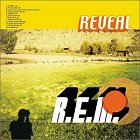 R.E.M. pulled a bit of a bait-and-switch with the first single from their new album, Reveal. “Imitation of Life” sounds a lot like the band’s work on albums like Lifes Rich Pageant and Green, enhanced by the acoustic and orchestral effects the band mastered on Automatic For The People and “The Great Beyond” (from the Man On The Moon soundtrack). Some longtime fans of the band, perhaps a bit disappointed with 1998’s Up, listened to Peter Buck’s uptempo electric guitar and said, “Ah ha, old school R.E.M. is back.”
R.E.M. pulled a bit of a bait-and-switch with the first single from their new album, Reveal. “Imitation of Life” sounds a lot like the band’s work on albums like Lifes Rich Pageant and Green, enhanced by the acoustic and orchestral effects the band mastered on Automatic For The People and “The Great Beyond” (from the Man On The Moon soundtrack). Some longtime fans of the band, perhaps a bit disappointed with 1998’s Up, listened to Peter Buck’s uptempo electric guitar and said, “Ah ha, old school R.E.M. is back.”
Well, as it turns out, not so much.
As good a song as it is, “Imitation of Life” is something of an anomaly on Reveal, which consists mainly of slower, sparser songs with a heavy amount of electronica, sampling and looping. Many of the songs sound more like they were assembled than performed. But while fans of the band may have once again had their hopes of seeing the band be what it used to be dashed, Reveal is another example of R.E.M.’s skill at the art of songcraft. Some of these tunes are forgettable or best left as background music, but some are among the most beautiful songs I’ve ever heard.
The opening track, “The Lifting,” is just outstanding. Michael Stipe’s lyrics conjure the possibilities of a break from worn-out routines and conventions and our reluctance to leave the safety that they provide. (The refrain: “You said the air was singing/It’s calling you you don’t believe/These things you’ve never seen never dreamed”) The electronic elements are crucial here; they give the song that otherworldliness that balances lines like “The weather’s fine/The sky is blue/It’s perfect for our seminar.”
The weight of missed opportunities and failed relationships haunts “I’ll Take the Rain,” an excellent ballad with some fine acoustic guitar work from Buck and what I believe to be Mike Mills’ usual excellence on the keyboards. The song alternates soft, understated verses with more expansive, lush choruses for an effect that is beautiful in a way that almost hurts to hear.
 Those three highlights make the album more than worth your time, but the rest of the album will grow on you if you give it time, and if you listen to it as a whole. I’m not sure “All the Way to Reno (You’re Gonna Be a Star)” will stand up well as the next single, for example, but on the album it fits. If you absolutely hated the very idea of Up, you probably won’t like this album, but if you liked Up, or thought it was a good concept but poorly executed, I’m pretty sure you’ll find something on this album worth adding to your favorite song list.
Those three highlights make the album more than worth your time, but the rest of the album will grow on you if you give it time, and if you listen to it as a whole. I’m not sure “All the Way to Reno (You’re Gonna Be a Star)” will stand up well as the next single, for example, but on the album it fits. If you absolutely hated the very idea of Up, you probably won’t like this album, but if you liked Up, or thought it was a good concept but poorly executed, I’m pretty sure you’ll find something on this album worth adding to your favorite song list.
- The Lifting (4:39)
- I’ve Been High (3:26)
- All the Way to Reno (You’re Gonna Be a Star) (4:45)
- She Just Wants to Be (5:22)
- Disappear (4:15)
- Saturn Return (4:55)
- Beat a Drum (4:21)
- Imitation of Life (3:57)
- Summer Turns to High (3:32)
- Chorus and the Ring (4:31)
- I’ll Take the Rain (5:51)
- Beachball (4:14)
Released by: Warner Bros.
Release date: 2001
Total running time: 53:46
Red Hot Chili Peppers – Californication
 Despite generally favorable reception to their 1995 album One Hot Minute, the Red Hot Chili Peppers dropped out of sight for a while and came back strong – partly because of the return of original member John Frusciante, back from a long and torturous battle with drug addiction. Despite the addition of Dave Navarro as a replacement for Frusciante on that previous album, the vibe somehow wasn’t the same (even though it yielded the minor hit “Aeroplane”). Now the Chilis are back in force.
Despite generally favorable reception to their 1995 album One Hot Minute, the Red Hot Chili Peppers dropped out of sight for a while and came back strong – partly because of the return of original member John Frusciante, back from a long and torturous battle with drug addiction. Despite the addition of Dave Navarro as a replacement for Frusciante on that previous album, the vibe somehow wasn’t the same (even though it yielded the minor hit “Aeroplane”). Now the Chilis are back in force.
The album kicks off with a funky quasi-rap, “Around The World”, which begs comparisons with the earlier hit “Give It Away Now”, but it’s in the second track that the Chilis find their new groove – driving, well-harmonized rock, combining the hard edge of their earlier material with a feel not unlike that of the early ’90s ballad “Under The Bridge”. The first single from Californication, “Scar Tissue”, is a perfect example of the new happy medium the band has struck (and the fact that it stayed on the charts for a while demonstrates that the instincts of Anthony Kiedis and his bandmates are still sharp). Other good examples include “Otherside” and the title track. And there are other tracks which delve surprisingly into ballad  territory, such as the excellent “Porcelain”. That may not be the kind of music that won the Chilis their large fan base, but damned if they can’t do it well.
territory, such as the excellent “Porcelain”. That may not be the kind of music that won the Chilis their large fan base, but damned if they can’t do it well.
Other tracks will satisfy the hardcore fans’ demand for harder-edged material, and though that’s not always my taste, it sounds crisp and there’s a little more production work going into it.
- Around The World (3:59)
- Parallel Universe (4:30)
- Scar Tissue (3:38)
- Otherside (4:16)
- Get On Top (3:18)
- Californication (5:21)
- Easily (3:51)
- Porcelain (2:43)
- Emit Remmus (4:00)
- I Like Dirt (2:38)
- This Velvet Glove (3:45)
- Savior (4:53)
- Purple Stain (4:13)
- Right On Time (1:53)
- Road Trippin’ (3:25)
Released by: Warner Bros.
Release date: 1999
Total running time: 56:26
Steely Dan – Two Against Nature
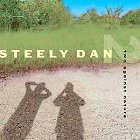 Every once in a while, Walter Becker and Donald Fagen pick up the hint that it took Jeff Lynne 15 years to pick up, and resurrect the band that everyone remembers them belonging to. Namely, in Fagen & Becker’s case, that would be Steely Dan.
Every once in a while, Walter Becker and Donald Fagen pick up the hint that it took Jeff Lynne 15 years to pick up, and resurrect the band that everyone remembers them belonging to. Namely, in Fagen & Becker’s case, that would be Steely Dan.
The only catch here, however, is that Fagen’s solo projects over the past 20 years have sounded more like Steely Dan than what now passes for Steely Dan. I have a bit of a problem with that. In many places, Two Against Nature sounds like Steely Dan; in a couple of places, it’s good Steely Dan, with “Almost Gothic” taking its place in the quasi-group’s pantheon of memorable, hummable tunes with literate, ironic lyrics. “Jack Of Speed” doesn’t quite live up lyrically, while “What A Shame About Me” stacks up lyrically but not musically. It’s almost as if they needed some more time – there are the beginnings of some really good songs on here, but it’s almost like the label told the musicians to wrap it up, because we’ve got to get Product on the store shelves.
I’m not going to dwell on this too long, but I’m not a big fan of the song “Cousin Dupree”. I know they’re trying to play it for laughs, but incest just isn’t funny. End of story. In this part of the country, in my line of work, I see  far too much disturbing stuff in our own news along these lines. I’ve also known a handful of families and friends whose lives have been forever changed by it. It’s not pop song material.
far too much disturbing stuff in our own news along these lines. I’ve also known a handful of families and friends whose lives have been forever changed by it. It’s not pop song material.
I wish I could give this a higher recommendation. I really do like Steely Dan, and really looked forward to this new effort…but it just has the feel of something which wasn’t ready for prime time.
- Gaslighting Abbie (5:56)
- What A Shame About Me (5:17)
- Two Against Nature (6:17)
- Janie Runaway (4:13)
- Almost Gothic (4:11)
- Jack Of Speed (6:21)
- Cousin Dupree (5:30)
- Negative Girl (5:35)
- West Of Hollywood (8:28)
Released by: Warner Bros.
Release date: 2000
Total running time: 51:51
Me First and the Gimme Gimmes – Blow In The Wind
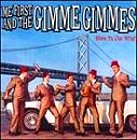 Me First and the Gimme Gimmes are almost miracle workers in my book. How could they actually make me like that miserably depressing Terry Jack tune “Seasons In The Sun”? By covering it in their own bizarre punk style – they’re all able musicians, the Gimmes, but at times they play the song just badly enough that it’s a redeeming trait. But their latest album – once again clocking in at a measley (and expensive) half-hour only – proves that they can, indeed, play the hell out of something if they so choose. And they’ve once again chosen the oldies, sticking to the 60s and early 70s so familiar to me from my own oldies radio experience. I love the music of this era – and the Gimmes attack it with aplomb, actually delivering well-played and at times almost reverent (note I said “almost”) covers of these tunes.
Me First and the Gimme Gimmes are almost miracle workers in my book. How could they actually make me like that miserably depressing Terry Jack tune “Seasons In The Sun”? By covering it in their own bizarre punk style – they’re all able musicians, the Gimmes, but at times they play the song just badly enough that it’s a redeeming trait. But their latest album – once again clocking in at a measley (and expensive) half-hour only – proves that they can, indeed, play the hell out of something if they so choose. And they’ve once again chosen the oldies, sticking to the 60s and early 70s so familiar to me from my own oldies radio experience. I love the music of this era – and the Gimmes attack it with aplomb, actually delivering well-played and at times almost reverent (note I said “almost”) covers of these tunes.
The highlights include “Elenor” (a Turtles cover), a little Lennon & McCartney tune called “All My Lovin'”, the Beach Boys’ “Sloop John B”, and an astonishingly good version of Cat Stevens’ “Wild World”. But not content to sing only those songs originally essayed by men, the Gimmes also have a field day with Petula Clark’s “I Only Want To Be With You”, Tammy Wynette’s “Stand By Your Man” (which, halfway through the song, becomes “Stand By Your Band”, a tribute to groupies everywhere), and “My Boyfriend’s Back” (in which not one single word is changed, not even to reflect gender). The results are hilarious, but the vocals, performances and production are sharpening quite noticeably. They’re not butchering the songs this time, as  was the case with a few of their offerings on the last album, Me First and the Gimme Gimmes Are A Drag.
was the case with a few of their offerings on the last album, Me First and the Gimme Gimmes Are A Drag.
Highly recommended – and they’re touring now! – though I do wish they’d turn out something more along the lines of the length of an actual album.
- Blowin’ In The Wind (1:44)
- Sloop John B. (2:09)
- Wild World (2:30)
- Who Put The Bomp (2:02)
- Elenor (2:33)
- My Boyfriend’s Back (2:26)
- All My Lovin’ (1:54)
- Stand By Your Man (2:01)
- San Francisco (1:47)
- I Only Want To Be With You (2:12)
- Runaway (1:59)
- Will You Still Love Me Tomorrow? (2:07)
- Different Drum (2:31)
- You’ve Got A Friend (2:32)
Released by: Fat Wreck Chords
Release date: 2001
Total running time: 30:27
Afro-Celt Sound System – Volume 3: Further In Time
 The third effort from one of world music’s most high-profile acts – thanks to their home on Peter Gabriel’s renowned RealWorld label and the attendant promotion they get – truly explains Afro-Celt Sound System’s longevity and their appeal. If anything, this might just be the album that breaks them into the mainstream.
The third effort from one of world music’s most high-profile acts – thanks to their home on Peter Gabriel’s renowned RealWorld label and the attendant promotion they get – truly explains Afro-Celt Sound System’s longevity and their appeal. If anything, this might just be the album that breaks them into the mainstream.
Further In Time features some high-profile guest gigs, with Mr. Gabriel himself taking the vocal duties on “When You’re Falling”, a cheerful, upbeat number, while Robert Plant of Led Zeppelin fame takes center stage on the mystical “Life Begin Again”, which just has the feel of a Led Zep number. I almost wish he could get Page in there and remake “Kashmir” with the Afro-Celts. Now that would be interesting.
Other highlights of the CD include the hyper-kinetic “Shadowman” (whose appeal is dimmed for me only in that one moment in which one of the vocalists shouts “Whassssuuuuuuup?” – and half the time I just let it slide because I like the rest of the song so much). I could see Shadowman making a dent in the clubs. The gentle vocals of “Go On Through” give that song a great appeal, and I hardly ever notice that the track tops out at just over eight minutes. It’s very relaxing. And “Lagan” just blows my mind, with its orchestral backing – it reminds me of some of the better tracks from Art Of Noise’s Seduction Of Claude Debussy, only more primal and mystic. “Onwards” could soothe just about anybody, no matter the circumstances. And “The Persistence Of Memory” has both the sound – and the shorter length – of a radio-friendly hit. I hope it happens for them this time. They deserve it for this album.
happens for them this time. They deserve it for this album.
I can’t recommend this one highly enough. I’ve enjoyed the Afro-Celts’ previous efforts, but their third time is the proverbial charm, raising the bar for their future efforts – and giving the uninitiated an excellent reason to check them out. Do pick this one up.

- North (6:49)
- North 2 (3:01)
- When You’re Falling featuring Peter Gabriel (5:14)
- Colossus (6:44)
- Lagan (4:04)
- Shadowman (6:36)
- Life Begin Again (vocals: Robert Plant) (6:22)
- Further In Time (6:32)
- Go On Through (8:03)
- Persistence Of Memory (4:29)
- The Silken Whip (7:18)
- Onwards (5:29)
Released by: RealWorld
Release date: 2001
Total running time: 70:41
Tim Finn – Feeding The Gods
 Poor Tim. Seems like he languishes permanently in the shadow of younger sibling Neil Finn (of Crowded House fame) these days – at the time Feeding The Gods was released, I had heard more news about what B-sides would be on Neil’s next single, and had no idea whatsoever that Tim was working on a follow-up to 2000’s excellent Say It Is So. Go figure.
Poor Tim. Seems like he languishes permanently in the shadow of younger sibling Neil Finn (of Crowded House fame) these days – at the time Feeding The Gods was released, I had heard more news about what B-sides would be on Neil’s next single, and had no idea whatsoever that Tim was working on a follow-up to 2000’s excellent Say It Is So. Go figure.
Feeding The Gods, as it turns out, is both a direct follow-up to Say It Is So and that album’s opposite number. Say It Is So was recorded during Finn’s pilgrimage to Nashville, featuring members of Wilco in the session band, whereas Feeding The Gods saw Finn importing his newfound American friends to home base in New Zealand, where much of the same sound was recreated – with a few new elements.
By and large, the same rough-edged, modern alt-rock flavor was retained from Say It Is So, with the addition of a little bit of horn work (though it sounded a bit sampled to me) on “Dead Man” (reminding me a little bit of Midnight Oil’s “Beds Are Burning”). Tim’s wife Marie continues to back him up on vocals, offering a sweet counterpoint to his increasingly throat-thrashing vocal style.
That voice gets a workout on rockers like “Say It Is So” (bit confusing and Jason Falknerish of him to put a song with the title from his last album on his new collection, isn’t it?), “Party Was You”, “What You’ve Done” and “Songline”. But the real gems on Feeding The Gods are the ballads. “Subway Dreaming”, “Waiting For Your Moment” and “Sawdust And Splinters” are highlights, as is the surprising “Commonplace”, which seems to amble along at a nice quiet pace until the chorus suddenly hangs a sharp right into an angst-filled thrash – it’s possibly the most musically challenging song on Feeding The Gods, and one of my favorites.
It’s also interesting to note that while one song title here refers back to the previous album, a lyric on that album also anticipates the title of the current release – the song “Some Dumb Reason” (from Say It Is So) contained the lyric “together we can feed the gods.”
Also included are the four music videos from Say It Is So – “Big Wave Rider”, “Twinkle”, “Underwater Mountain” and “Death Of A Popular Song” – in QuickTime form. This is a very cool feature which a lot of Finn fans will appreciate, especially since quite a few of us live on continents where poor old Tim doesn’t have a snowball’s chance in hell of getting into the MTV or VH1 rotation (on those rare occasions in which those purported music video channels actually hearken back to their original mandate of showing music videos, that is). “Underwater Mountain” turned out to be my favorite, a nifty little slice of Chiodo Brothers-style animation, while “Big Wave Rider”‘s unexpected, I-can’t-believe-they-showed-that spoof of Hollywood car chases and horror flicks gave me a big belly laugh while also making me slightly sick to my stomach. The clip for “Death Of A Popular Song” also spoofs horror movies, with Night Of The Living Dead and especially the Raimi brothers’ Evil Dead films springing instantly to mind, as Tim – after suffering a Peckinpah-style death by shootout – rises from the grave and starts singing, scaring off the people attending his funeral and gradually decomposing throughout the song (!). The videos, bereft of big budgets and effects, joyously recall the early/mid 80s music video aesthetic which has sadly been lost from that form of entertainment. It reminded  me of how much I really used to enjoy videos.
me of how much I really used to enjoy videos.
Overall, I can recommend Feeding The Gods for both Finn fans and the uninitiated. Either way, prepare to have some of your conventional notions of pop song structure challenged – but challenged in a good way.
- Songline (3:20)
- I’ll Never Know (4:58)
- Subway Dreaming (4:16)
- Say It Is So (2:44)
- What You’ve Done (3:43)
- Sawdust And Splinters (4:00)
- Dead Man (4:00)
- Commonplace (4:57)
- Waiting For Your Moment (2:46)
- Party Was You (3:15)
- Incognito In California (3:44)
Released by: Sonny’s Pop
Release date: 2001
Total running time: 41:43
